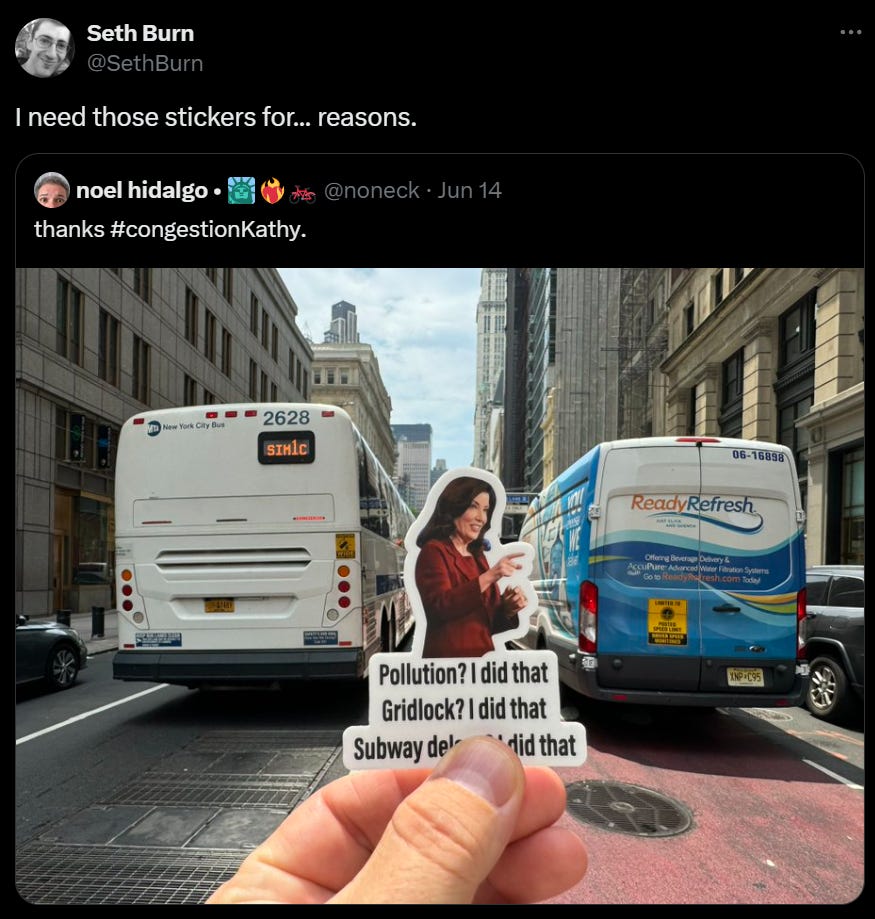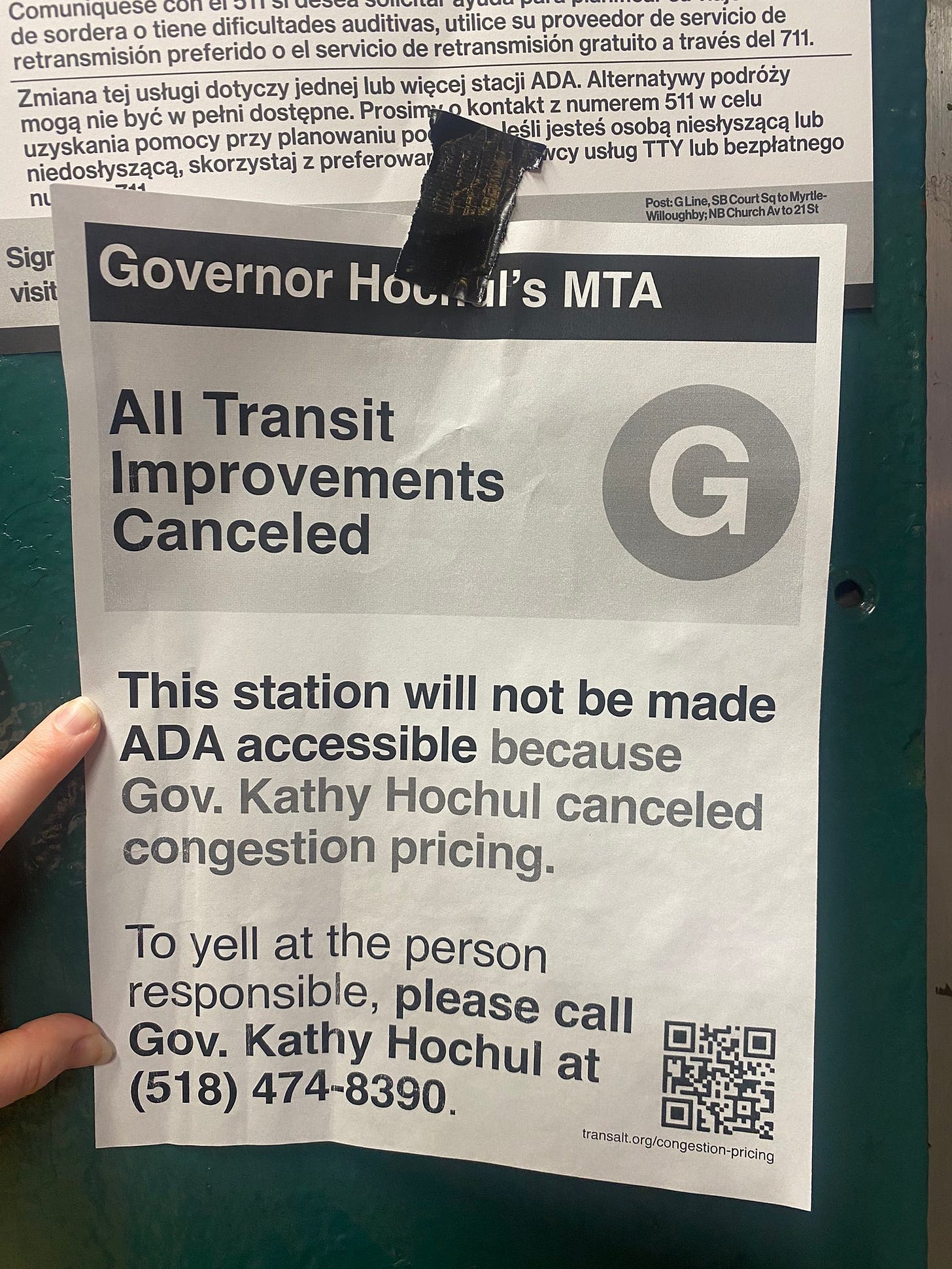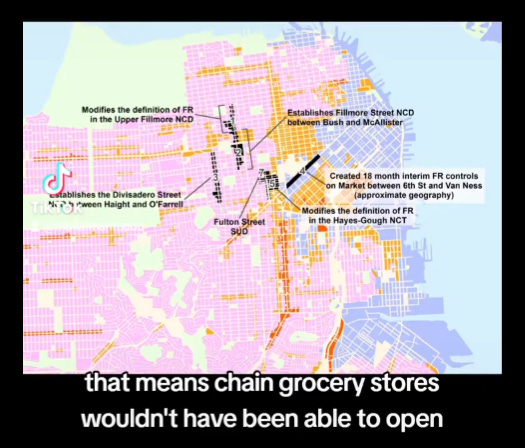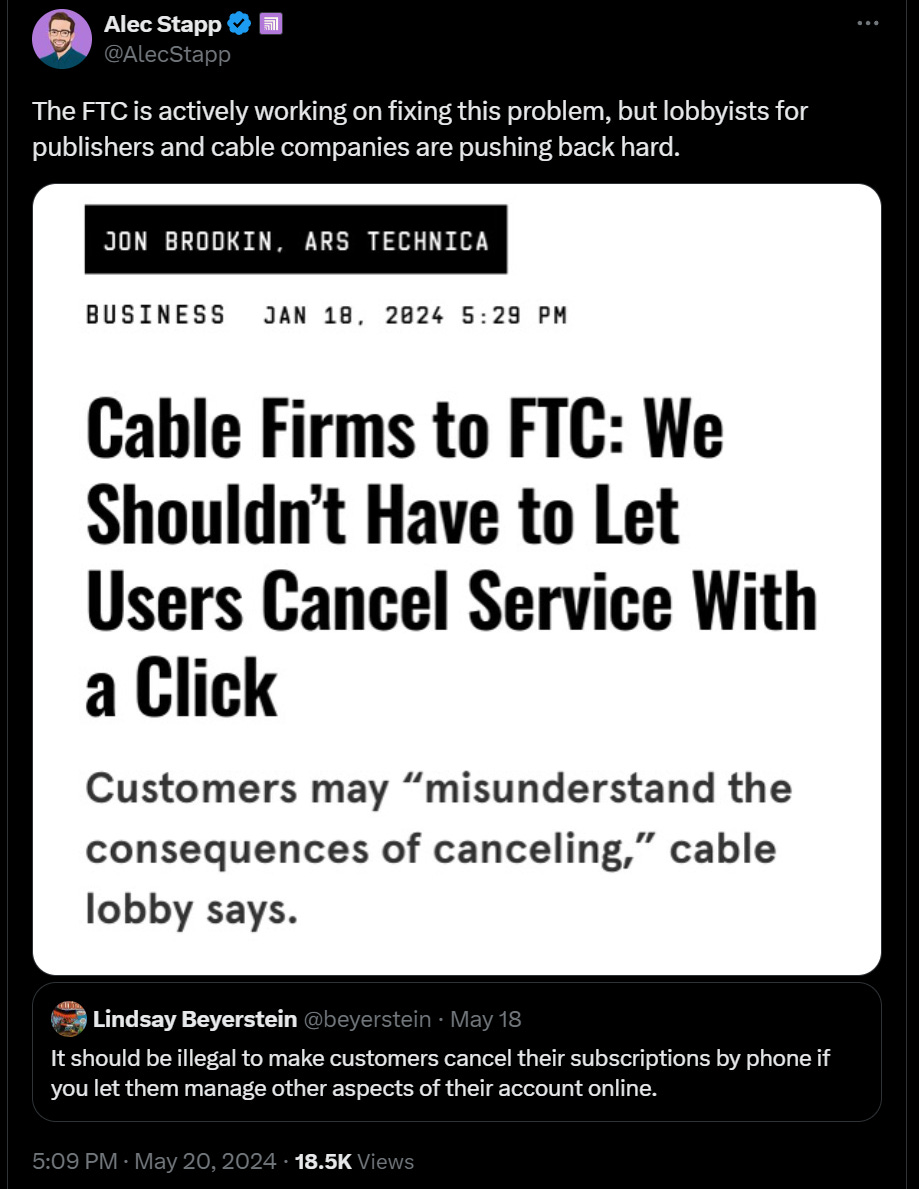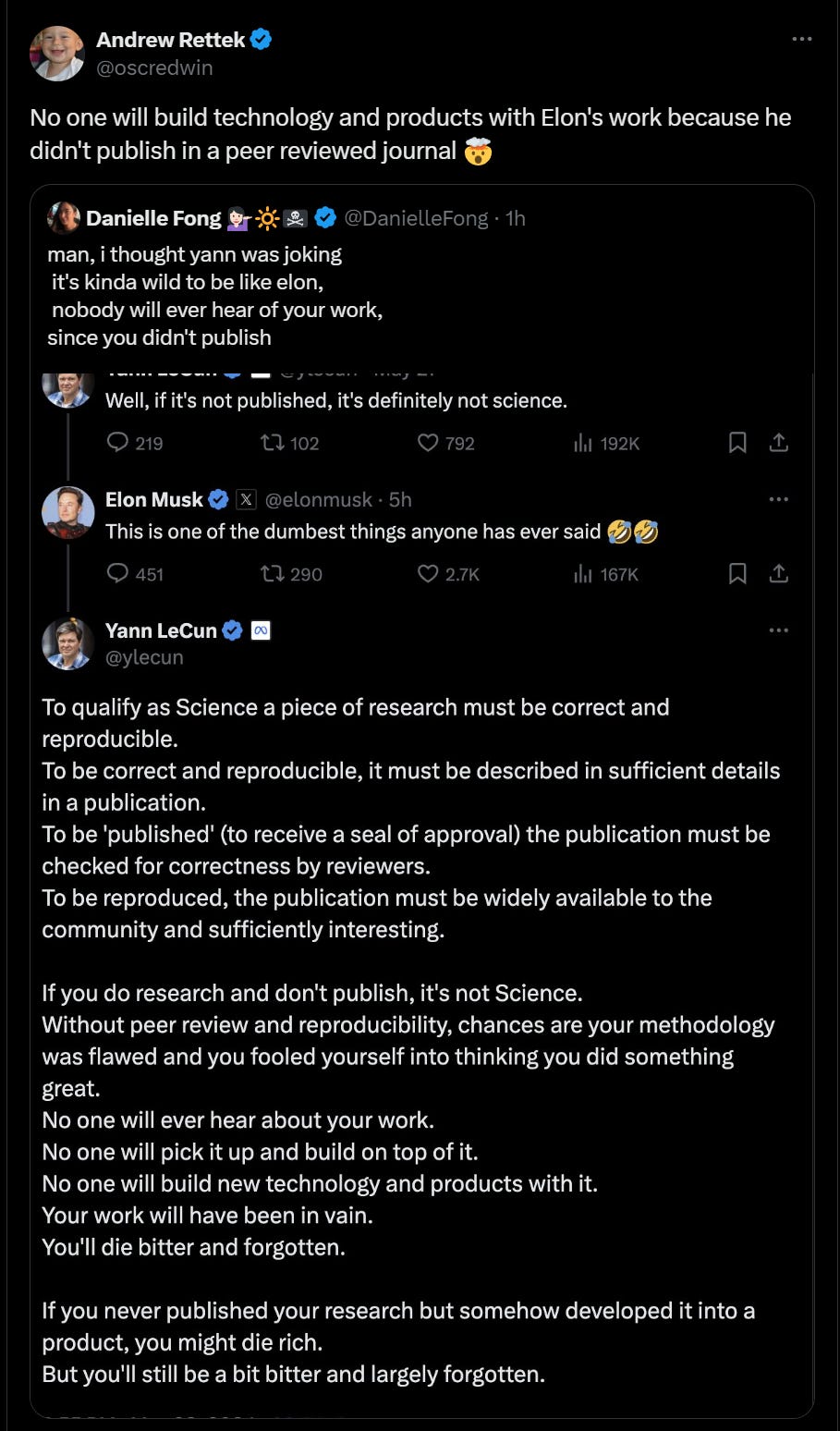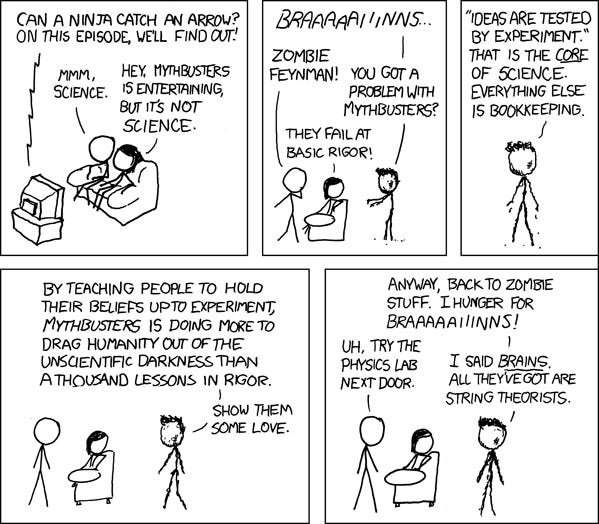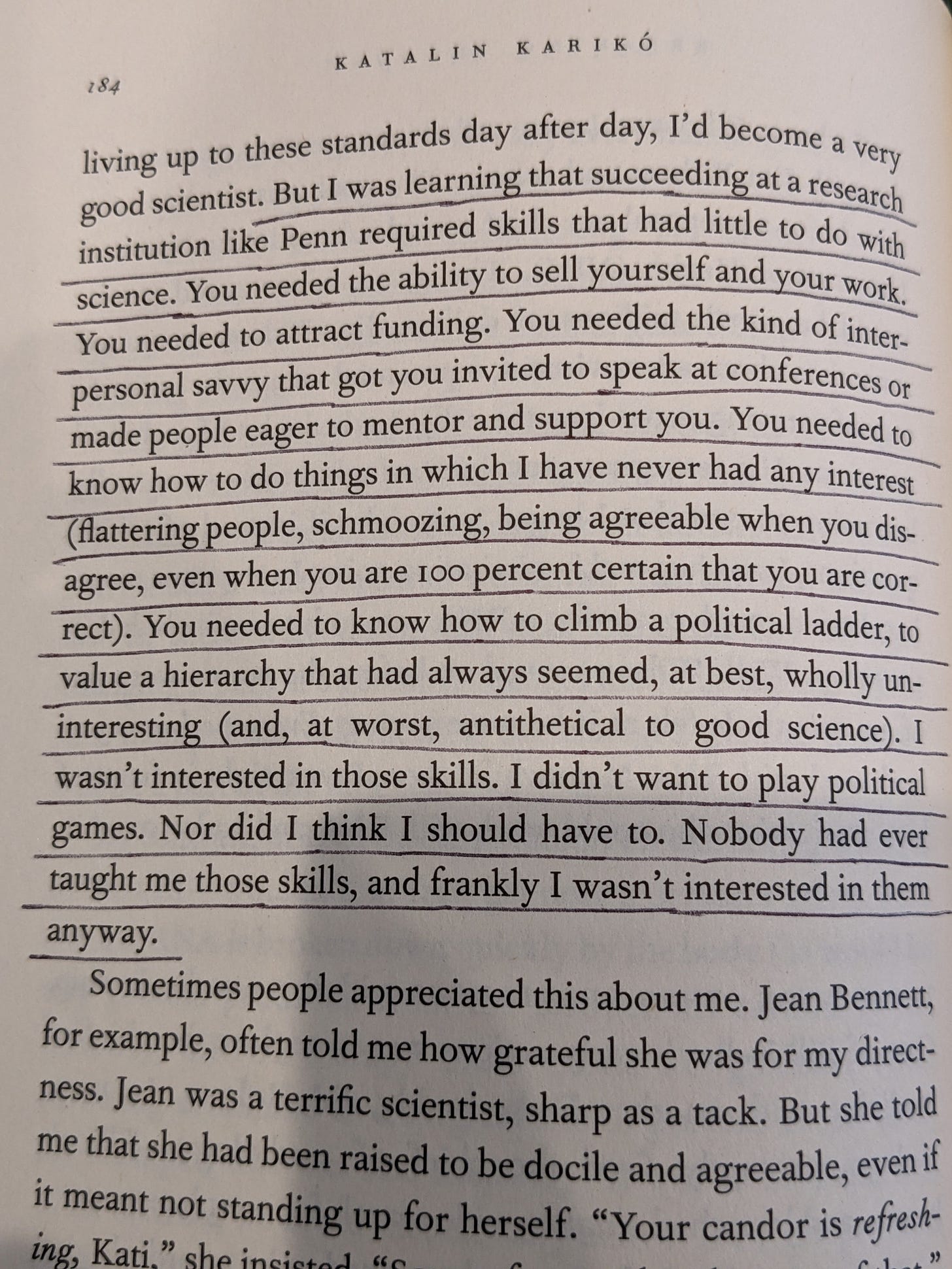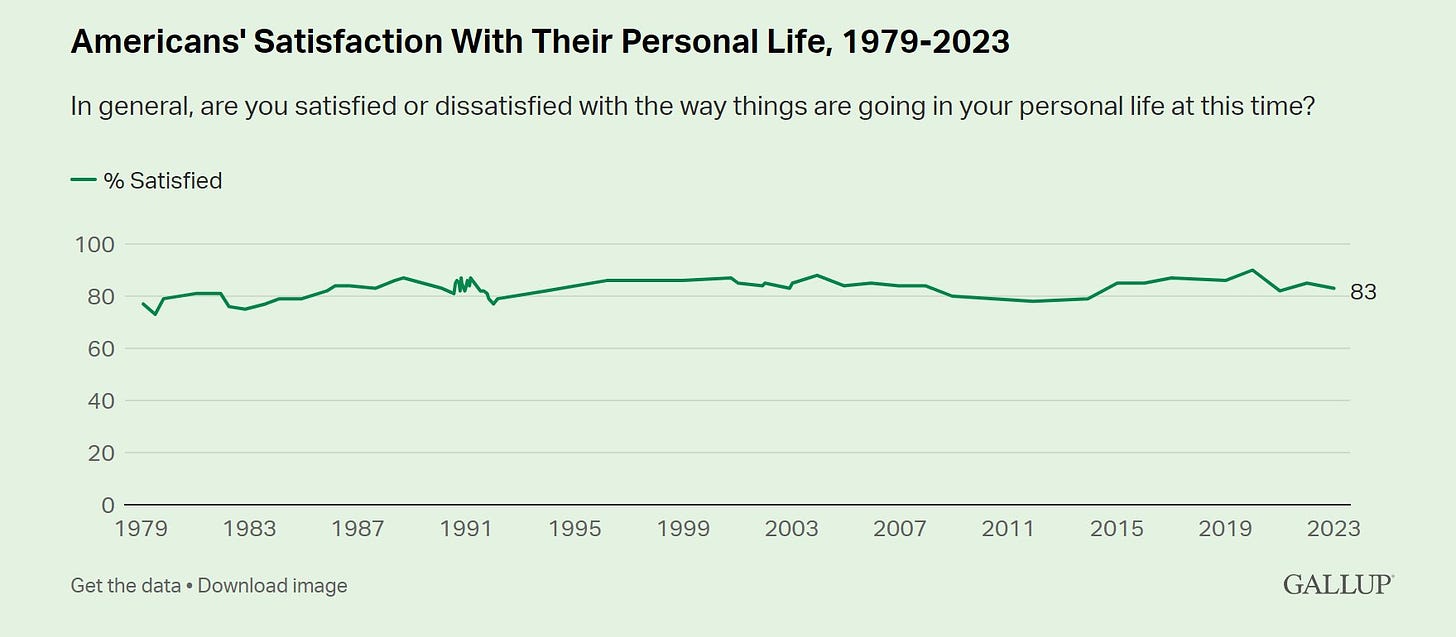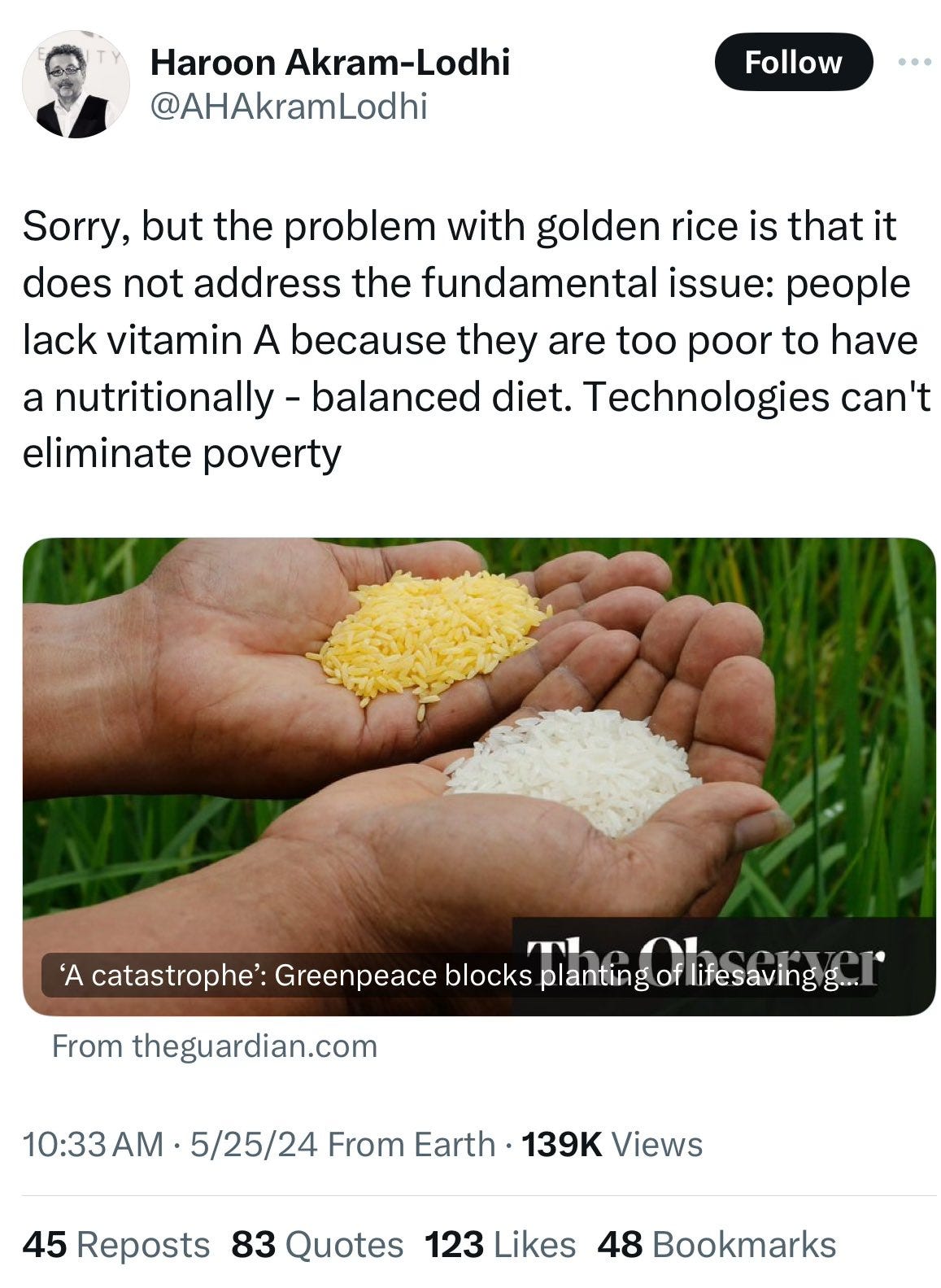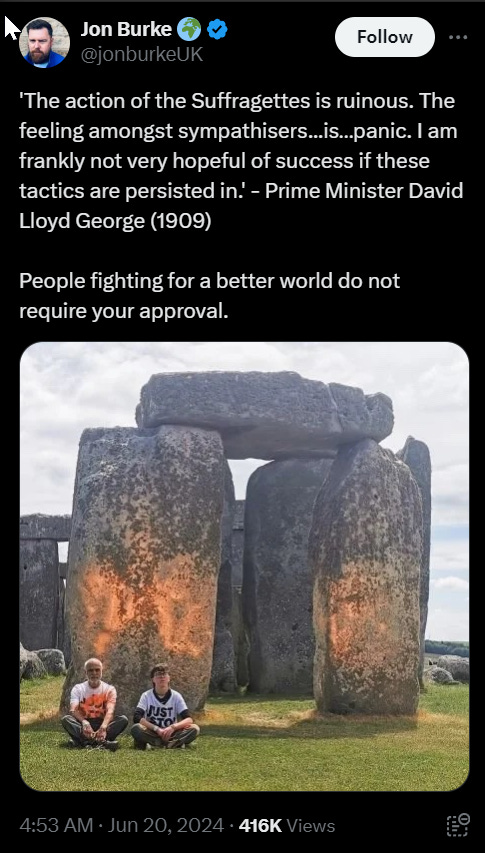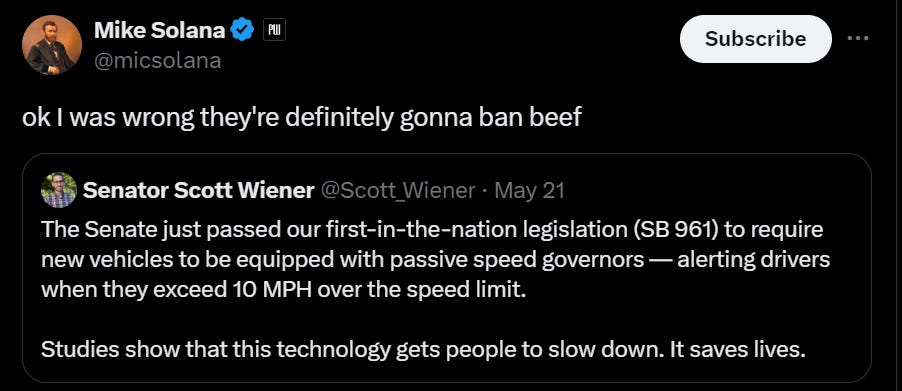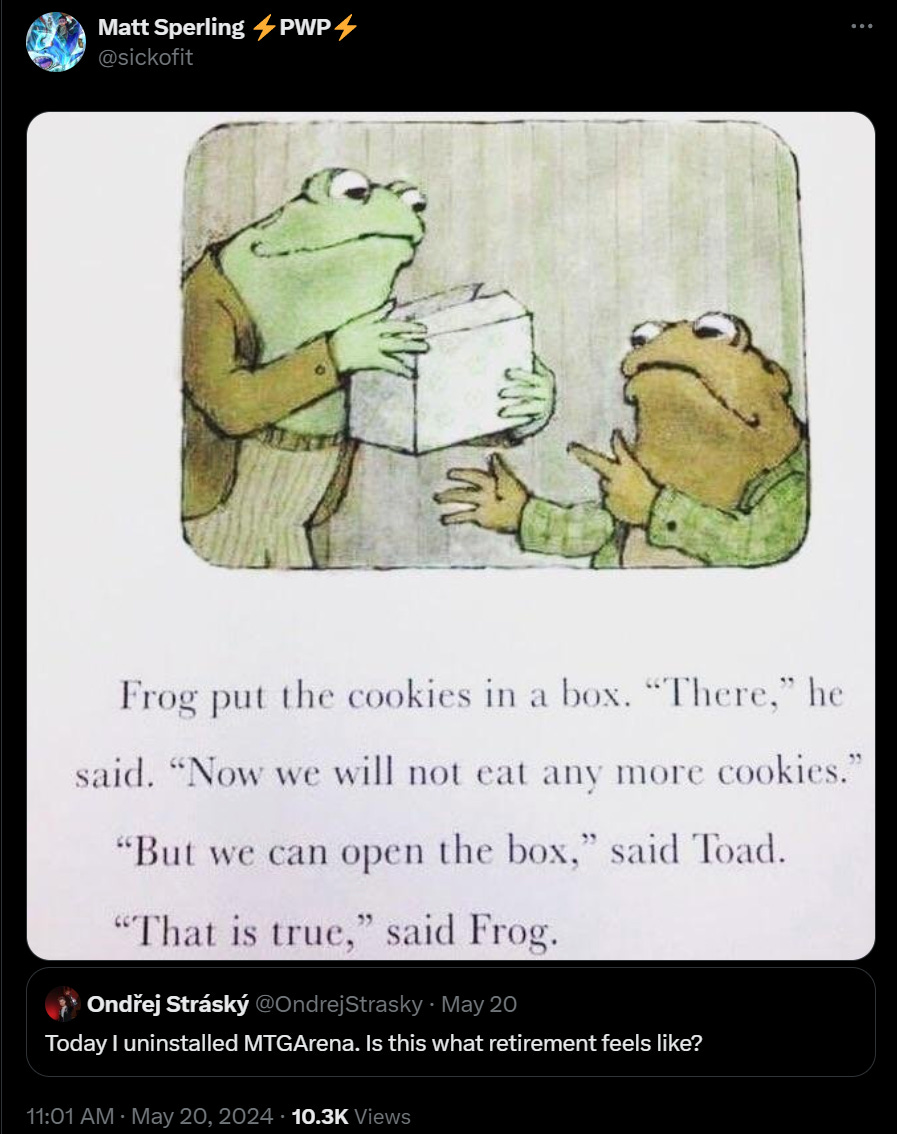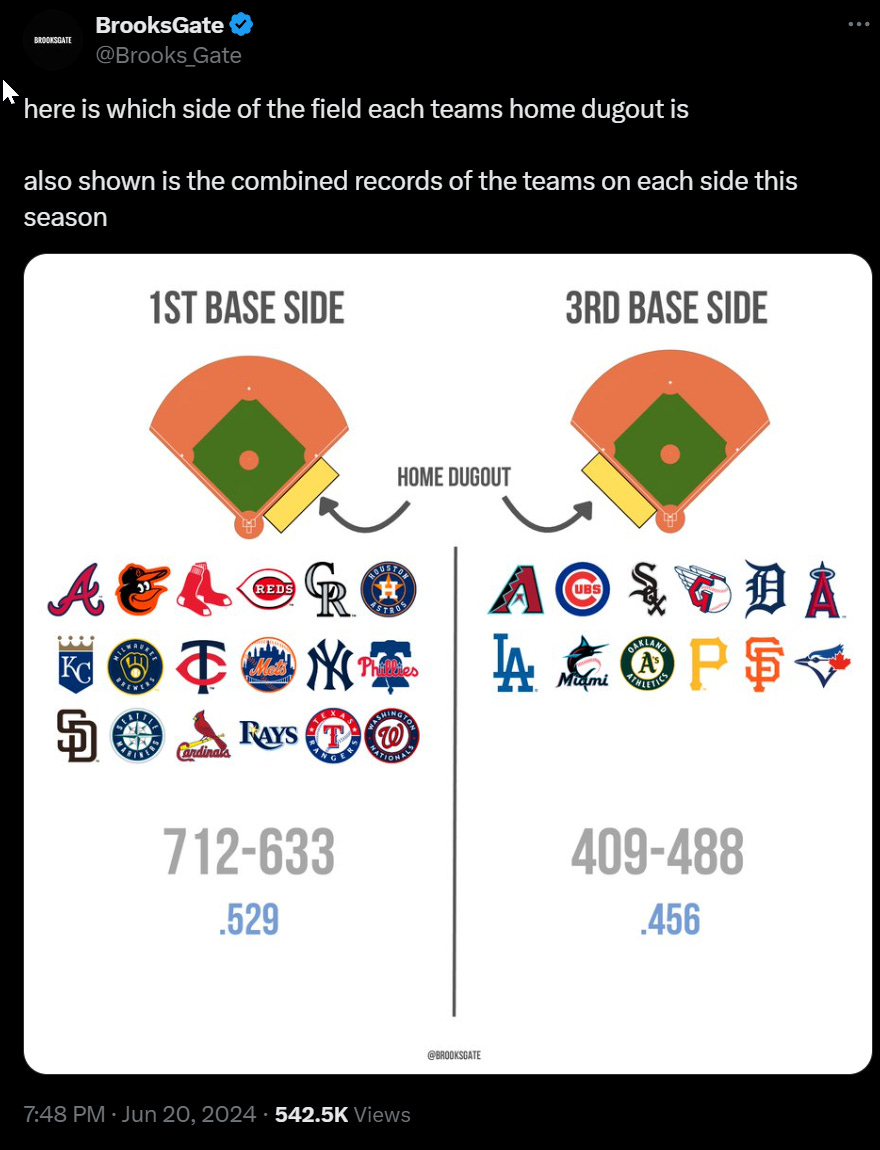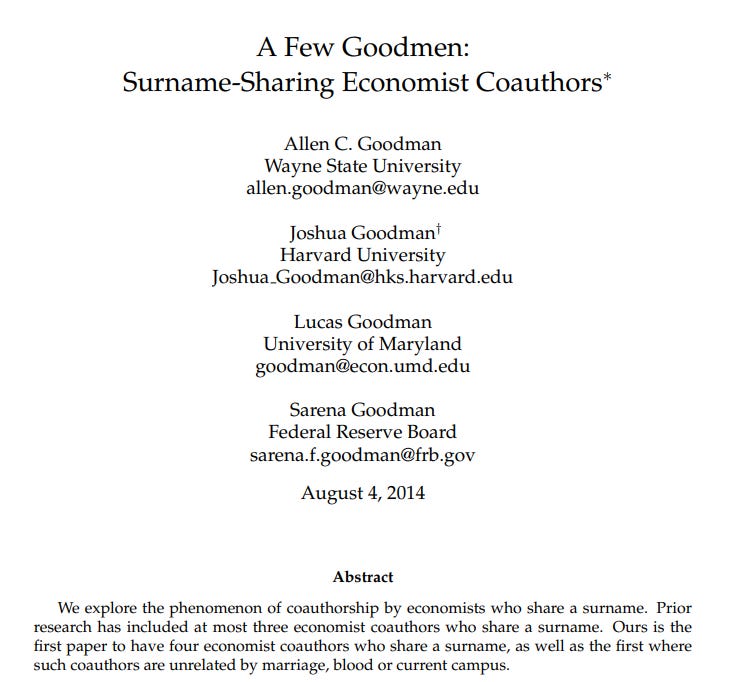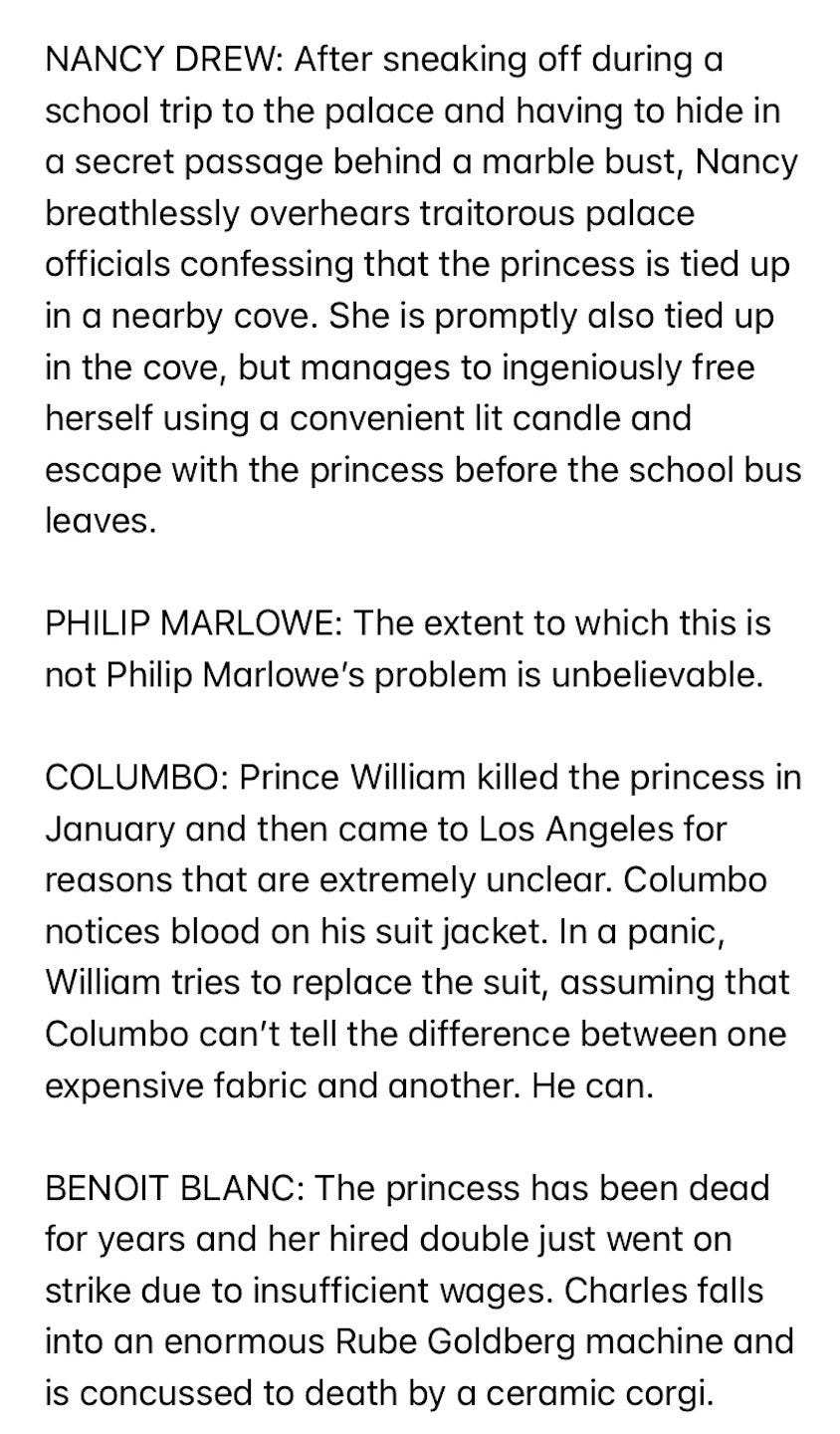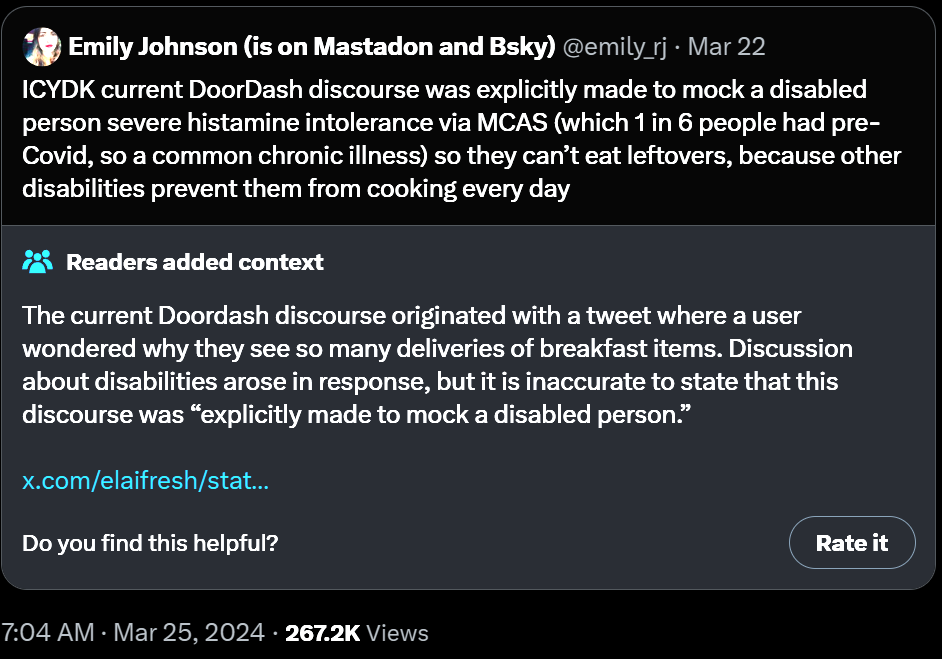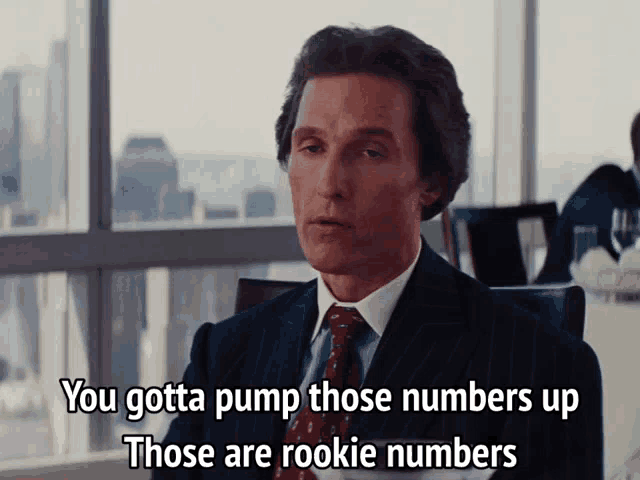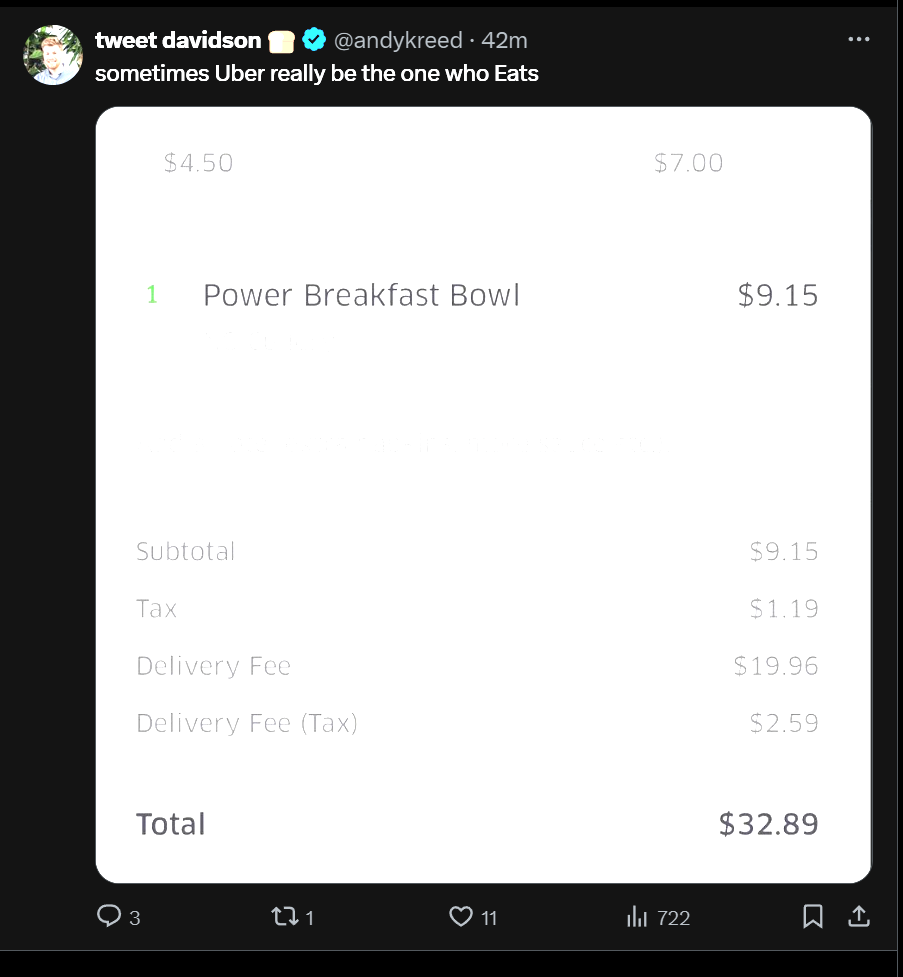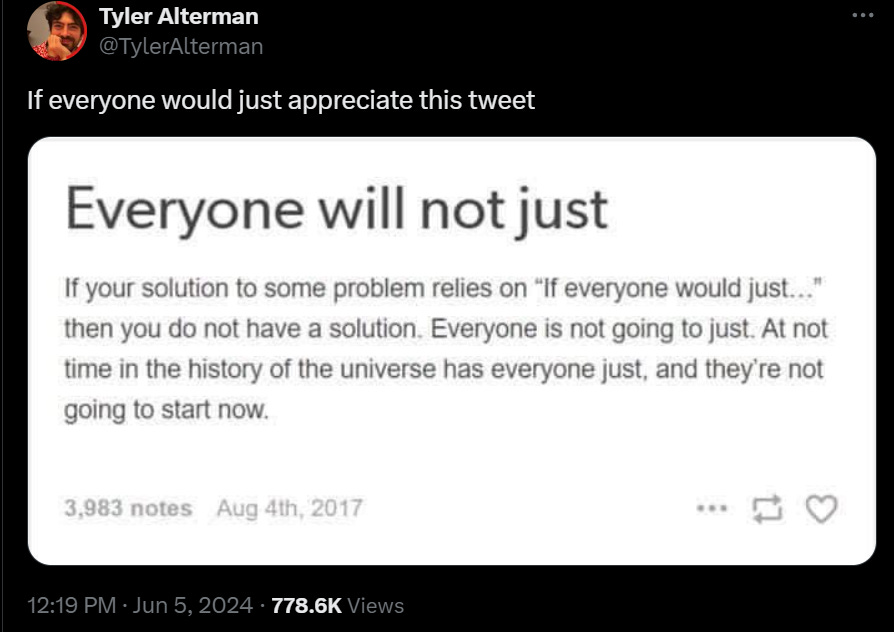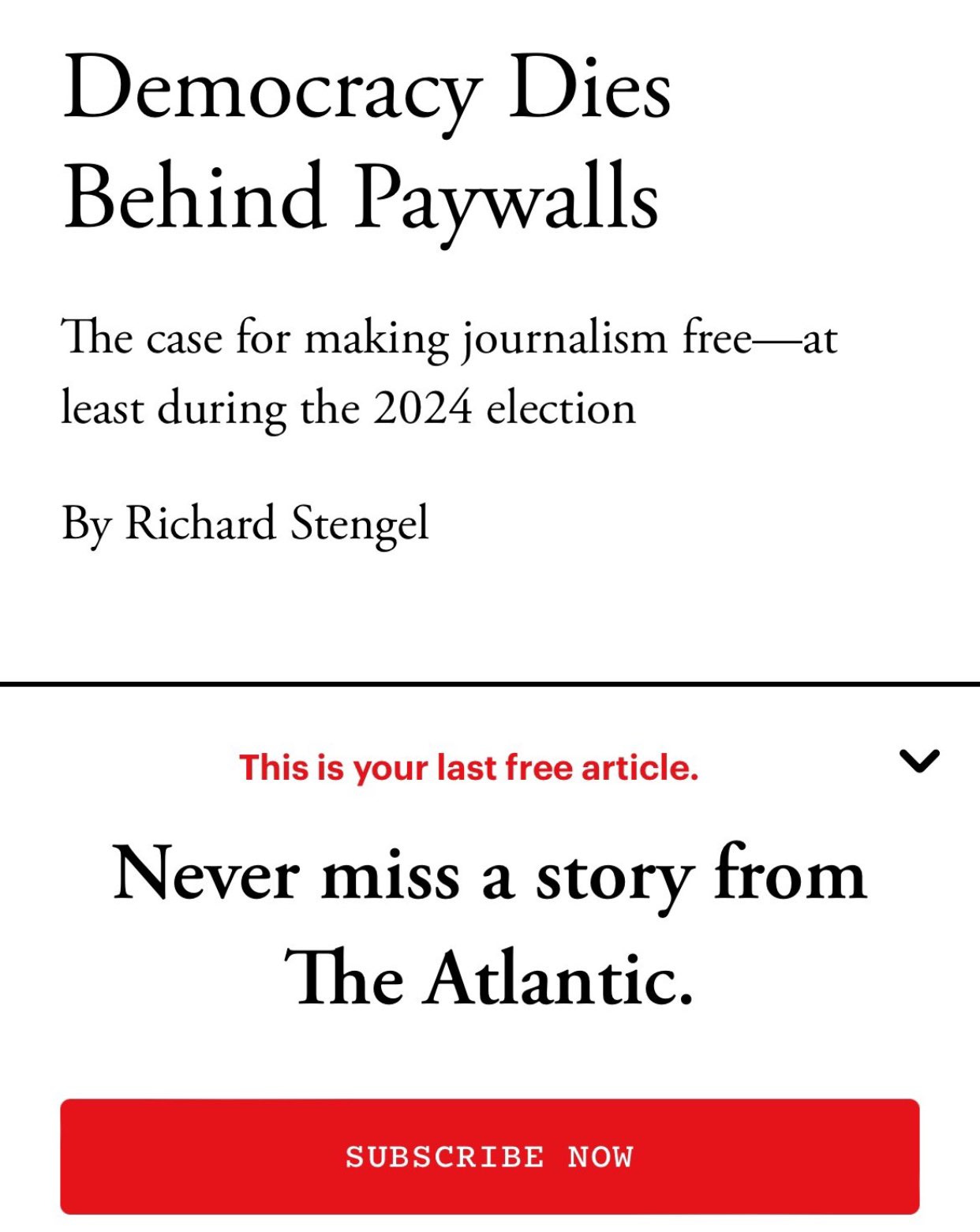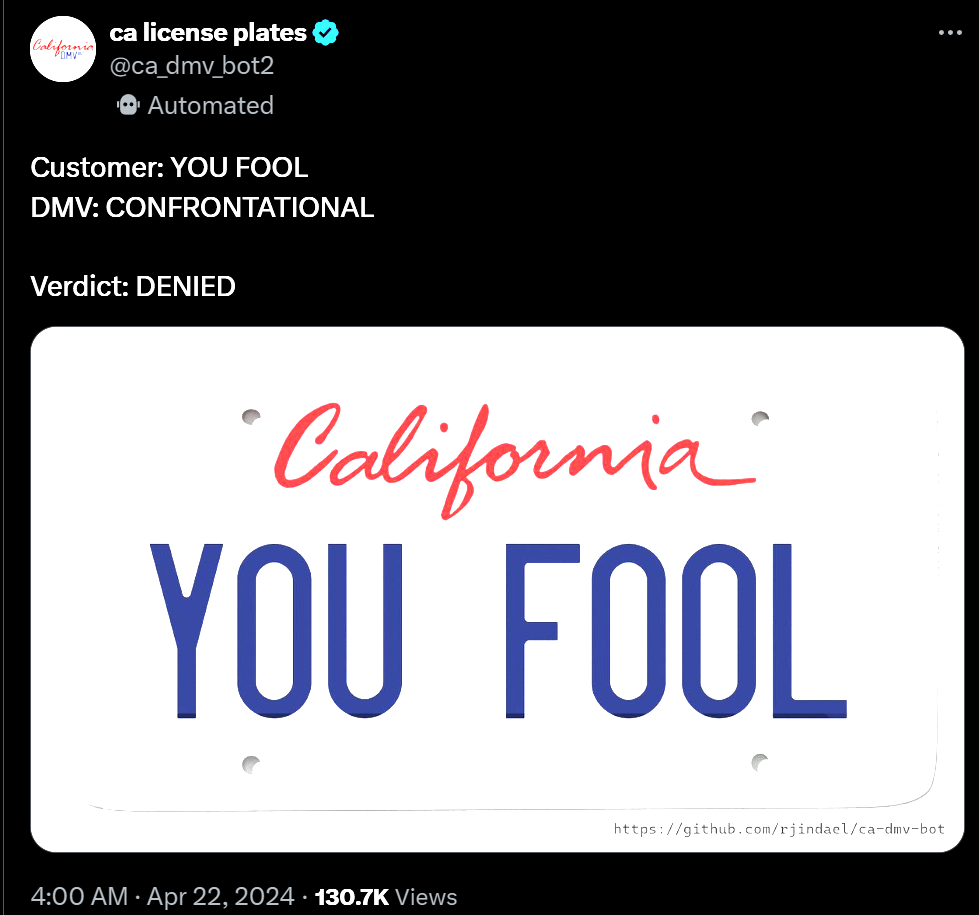Looks like we made it. Yes, the non-AI world still exists.
New York Governor Kathy Hochul has gone rogue and betrayed New York City, also humanity, declaring a halt to congestion pricing a month before it was to go into effect. Her explanation was that she spoke to workers at three Manhattan diners who were worried people would be unable to drive to them from New Jersey. Which, as Cathy Reilly points out, is rather insulting to New Jersey, and also completely absurd. Who in the world was going to go into Manhattan for a diner?
She says this won’t interfere with Subway work. Work on the 2nd Avenue Subway line has already been halted. And that’s not all.
You’re damn right. We are going to blame Hochul. Every. Damn. Time.
So Elizabeth Kim investigated. One never talked politics at all. One is directly across from Grand Central, is not a diner, and actively wants congestion pricing. The third did in fact object. That’s it. The good news is Hochul’s attempt to prevent this seems likely to be illegal, so maybe it won’t stop us.
The good news is this was so dumb that she might get primaried, but we will have to wait until 2026.
This terrible thinking is not an isolated incident.
Governor Kathy Hochul (D-NY): The next few days it’s going to be hotter than hell across New York — so we’re making admission and parking free at all our State Parks, pools, and beaches tomorrow and Thursday!
Take your families to beat the heat, and enjoy it on us ☀️🌊
Matthew Yglesias: When faced with high demand for an excludable, rivalrous good with inelastic supply, I would make the price higher rather than lower and use the revenue for something useful.
Trump endorsed high skill immigration explicitly on the All-In podcast. He even said, only half prompted, that anyone who graduates from even a junior college should get a green card to stay in the country. It is amazing how clearly he speaks here. There is little question that Trump ‘gets it.’
Yet Trump’s track record is of course very different. Remember Trump’s H-1B Visa suspension in 2020?
So I wrote I was not optimistic about Trump following through, and indeed he has already ‘walked this back.’ Notice Fox News saying this was somehow a promise about ‘migrants.’
We should still obviously take this all up immediately in a bill and see who votes for it.
High skill immigration is overwhelmingly popular across the board, but political gamesmanship has meant we don’t have it. Shame on everyone. Fix it.
No, I don’t care that this isn’t being tied to other things you also like. FIX IT.
There is of course a potential problem with the equilibrium.
Austen Allred: I love the idea of letting more skilled labor into the United States (and making it easier to stay), I just want to make sure we realize “everyone who gets a degree gets a green card” would be mostly driven by diploma mills.
Mark Krikorian (Center for Immigration Studies, Executive Director): If someone earns a Ph.D. at a university in a hard science, I personally will drive to their house and give them a green card. The issue is any foreign college graduate, even from a bogus two-year master’s program or gender studies [major], would get a green card.
Trump explicitly included even junior colleges. Which would absolutely mean this gets dominated in terms of number of students by diploma mills, especially once that opportunity is established.
You know what? I say that’s fine, if that is what it takes. The top people matter a lot, and if you get a bunch of other young people who clear even a moderate bar, that is going to be good too. It’s not even clear raising standards would be better.
We could do something that better addresses everyone’s concerns by being narrower, and I would be happy to start there if that is what it takes. But of course Trump did not walk this back to ‘we need to limit this to real degrees from real schools in real things’ or anything like that. He went back to his anti-immigration rhetoric, full stop, as if this never happened.
Salad Size Me, eating only Sweetgreen for two weeks, goes as you would expect. The shorter duration (versus the original Super Size Me) was initially based on cost considerations, but being able to stop after two weeks was priceless.
Any time you think people know things they have no practical need to know, remember that only 1% of college students know that Hannibal was from Carthage.
Isaac King: This seems like a common failure mode in knowledge-based hobbies. People pour a ton of effort into learning the details of their field, giving it personal importance to them, and they incorrectly generalize this to a belief that their obscure trivia is of general importance.
I’m never sure whether I’m doing this. When I encounter someone who doesn’t understand some basic-seeming-to-me math or science concept, is that actually a real problem, or just me ascribing undue import to something that happens to interest me?
Women, the young and the left leaning in academia are more censorious than their counterparts, and more likely to discourage various forms of research. Cory Clark reports about 10 ‘taboo claims.’
So of course Robin Hanson offered polls on these so-called taboo topics. The ‘controversial’ positions got overwhelming support. The tenth question, whether demographic diversity (race, gender) in the workplace often leads to worse performance got affirmed 54%-17%, and the rest were a lot less close than that. Three were roughly 90%-1%. I realize Hanson has unusual followers, but the ‘taboo questions’ academics want to discuss? People largely agree on the answers, and the academics have decided saying that answer out loud is not permitted.
Cocoa prices are dangerously high and might take years to come down. Worth it.
Disney started giving its rides long official names rather than using casual nicknames people would actually use, forcing influencers to use the real names. Which means you know they’re paid and they sound like a duffis.
You can buy vapes on which you can play Pac Man. Our watching out for the children principle is, shall we say, inconsistent.
Stadium tours doing poorly, many of them being cancelled. The upside profits are huge, and touring a ton is a very non-free action, so perhaps this is the equilibrium. If you are not failing at a large fraction of your stadium tours, you are not attempting enough stadium tours. My experience however is that you get rapidly decreasing marginal utility from going to bigger events. When I went to Radio City Music Hall to see Taylor Tomlinson’s Have it All tour, I had a solid seat and a great time, but I had to force me eyes to look at the physical Taylor rather than the giant screens of her. I’d pay substantially more to go to the smaller Beacon Theater, although I’m sure it would still add up to a lot less.
Prediction markets are unpopular. Sure, lots of people in my circles love them and want there to be more of them, but activity is limited even when you get them, and usually focused on stuff not that interesting. The basic thesis here from Nick Whitaker is that without subsidies no one wants to trade, so you need subsidy in the form of either cash, natural hedgers or suckers at the table, and usually you have none of them, nor do you appeal to investors trying to make a buck, and being slow to resolve is a huge issue.
This is all broadly compatible with my perspective from a while back. I strongly agree that you need subsidy if you want to get good action. Alas, people are mostly unwilling to pay. I think we basically need to ‘suck it up’ and be willing to pay for information, both to subsidize traders and encourage reliable wording and resolution.
As I’ve tried to use Manifold, my biggest frustration has been resolution criteria. Why do we see the same few markets over and over? It is not because those are the only interesting questions. It is because those are the questions we can quantify. If you cannot quantify, you get endless tsoris, and can’t play for real amounts. By default unclear markets turn into betting on how the judge is going to see the problem, and that is not something I care about.
I’m definitely planning on being less accommodating with nitpicks on market resolutions, especially hypothetical ones, going forward, because time is short and the stakes not so high. Yes, that means you are predicting in part how I will rule. Tough. I don’t trade on my own markets to avoid conflict of interest issues.
Modern buildings are ugly. We made that decision. We woke up, time and again, and we chose ugly. I do not understand how anyone fell for this, but a lot of people did. The cost argument does not check out. I know people actually prefer nice things in practice.
I would offer two other explanations not listed there.
-
Vetocracy and permitting and regulatory requirements including zoning. If you have to struggle to get permission for every detail of what you try to build, and anyone can say no, are you going to risk delays or refusals in order to create something not ugly? Do you want fights over details? Or will you go with the ugly thing that you know is standard and where no one will complain too loudly?
-
Externalities. When you create something beautiful, the whole world wins. When it is ugly, the whole world suffers. You do get the brunt of both, but a small fraction of the overall effect. It is only somewhat priced in. It makes sense that you would not invest sufficiently in it. This used to be made up for by people caring about that sort of thing inherently and it granting more status.
For public buildings externalities are sort of priced in, but not fully, and you have even more of a vetocracy and designed by committee issue, on top of the ‘yes someone pulled a con on us and convinced Very Serious People ugly was good somehow’ the article discusses. For private ones, you have both issues.
In potentially a big practical deal, the courts have now ruled that CEQA (California Environmental Quality Act, their version of NEPA) should no longer be construed to give the ‘fullest possible protection,’ a formula that means no one ever does almost anything, and instead treat it as one would an ordinary law. Maybe we can build some things now.
Government actually working: If only the system worked like this more often, in response to a call to extend our insane child car seat requirements to airplanes:
Kelsey Piper: Fun fact, the FAA reviews this periodically and always concludes that, by raising the cost of flying and making more people drive, it would likely increase child deaths.
This is my literal favorite fact about any regulatory body and I cannot shut up about it because so many regulations are written with willful obliviousness to the harms done by making things more expensive and annoying.
Imagine if we went back and analyzed all our existing rules around airplanes, and everything else, around similar principles.
Biden tariffs on China seem quite bad, thanks to Governor Polis for being willing to say it plainly. Taxes on input goods like the 25% on steel and aluminum are madness.
Activists successfully lobby Belgian government to give prostitutes ‘proper labor contracts’ that give them all the protections, rights and procedures you get in the European labor market. Then people realize what those rules imply, and ‘when you refuse to do assigned tasks ten times in six months we call in a government mediator’ suddenly sounds like what it is when you those tasks are often sex acts. If you are going to mandate contracts and salaries and benefits and refusal rights and make it hard to fire workers, that has consequences, and not all of them are the higher prices.
Another brief analysis on the government anti-trust case against Apple.
Ben Krauss at Slow Boring proposes higher education for police officers, both a dedicated university and programs at universities, complaining that our police officers get less hours of training. Oh no, the default reaction should go, more occupational licensing and credentialism and wasteful gatekeeping and signaling, even if as he suggests we don’t increase requirements outright. I very much did not buy the case that this solves any of our real problems.
California rules on wages and fees continue to take their toll on restaurants. The costs add up. I do not however have sympathy for those complaining they will have to bake the fees into menu prices. That seems great. Yes, there will be initial sticker shock, but this puts everyone on a level playing field. In general, the game of ‘everyone is forced to hide the true price’ is a great place for intervention. Ben Phelps has similar thoughts in this Twitter thread.
Why did it take 10 years to open a Trader Joe’s in Hayes Valley? For years they wouldn’t let anyone open a ‘chain grocery store’ anywhere pink on this map:
So they passed particular laws to ‘allow’ a grocery store in an area with no grocery stores. The first time, they couldn’t open until a condo was completed (because shrug) and that took so long the store backed out. Then in 2019 they tried for a Trader Joe’s, but the developer was caught bribing officials to let the development go faster, so it had to wait until they were bought out.
The obvious question is why anyone thinks banning ‘chain’ grocery stores was a sane idea in the first place?
I considered putting this one in Crime and Punishment.
Shirt, raising questions it answers.
European Union has declared itself opposed to encrypted chats, and is trying to pass laws to that effect. Signal has promised they would leave Europe rather than comply. Matthew Green says they are extremely close to proposing such a law. It might have already passed by the time you read this.
Symbolic importance: UK hotels engage in weekly fire alarm tests that everyone treats as not real and they look at you funny if you don’t realize. Never sound an alarm with the intention of people not responding, even or especially as a test.
A big advantage and also big danger of becoming rich and powerful is people get afraid to tell you no. In some contexts, that is great, you get what you want and you can motivate people to do things. When flying in bad weather, not so much.
Kelsey Piper: There are several famous plane crashes that killed presidents where foul play was strongly expected and the ultimate explanation was crew inexperience and a terror of telling the President that what he wanted them to do was ill advised. This is one, this is another.
There are also some billionaire plane crashes with a similar dynamic. Pilots who should have said “no, I am not qualified to safely do that”, who would have said that to an ordinary client.
Money and power can buy a lot of things but they seem actively counterproductive sometimes for purchasing “someone who will tell you that the thing you want is actually a bad idea and they won’t do it”.
This is part of why such people sometimes find it highly refreshing and useful when they find someone willing to tell them no. The problem in the case of planes is that planes are far too safe. So you want the pilot to be bolder than normal. But not too bold.
Macron calls snap elections in France, despite clear danger Le Pen and the far right could win, on theory that the threat of Le Pen and the far right winning means he will win. It probably works, the problem is it sometimes doesn’t. This is a central problem with democracy. Everyone wants to run against the existentially disastrous (in the eyes of their voters) candidate, so they can win, right up until eventually the the disaster happens. Generalize this, including to AI.
Biden Administration to ban medical debt from credit reports. If it cannot go on your credit report, why would anyone pay a medical bill that was not big enough to justify going to court, or at least one they did not feel was fair, especially as social norms around this shift? If that’s true, asks Robin Hanson, who would issue this ‘medical debt,’ and offer services without payment or insurance in advance? Mostly I think all of that is fine. Instead of fake super inflated bills no one consented to, we’d get up front known pricing, and people could take on other debt to pay for it as needed. It’s still illegal to not provide sufficiently urgent care either way.
The alternative is to continue with billing like this, where an ER visit costs $2215 for ‘the visit,’ $1200 for a nurse’s swab of a 3 year old’s throat for a covid/strep test, $740 for two minutes with the doc, then the ‘cash pay’ is $685. End this scam.
Flo Crivello reports from time at Uber eight years ago (so things may have changed) that for finding shortest routes, Apple Maps was best, followed by Google Maps, and Waze was far behind both. Waze perhaps makes people feel smarter and in the know, but it is too clever by half and did not (at least then) actually translate into faster routes.
Why did Google never implement a ‘nicest route’ button? Because people might use it to select nicer routes, thus choose to give foot traffic to richer areas. So they decided to hide this information from their customers to avoid this.
If it had ended here it would have been purely for the popcorn: A conversation between Yann LeCun and Elon Musk, part one.
People will actually tell Elon Musk he has never done Science and will die bitter and forgotten because he did not publish, or did not publish in the proper scientific journals.
After a highly justified roasting all around, Yann quickly retreated back to the Motte, which is far more reasonable.
Yann LeCun: So much misunderstanding of this comment!
Here is a list of things I am *NOTsaying:
– you need a PhD to do Science. You don’t. A PhD teaches you to do research, but you can learn that on your own (though it’s much easier with a mentor).
– you need to get papers accepted by a journal or conference to publish: you don’t. You can just post it in http://ArXiv.org. Many influential papers never went through the formal peer review process, or went through it after they became influential.
– engineering is not science: it can be, depending on your methodology. I’m a scientist *andan engineer. These activities are complementary and need each other.
– science requires formal papers: it doesn’t. A clear explanation on a website and a piece of code on a public repo will do.
What I *AMsaying is that science progresses through the collision of ideas, verification, analysis, reproduction, and improvements.
If you don’t publish your research *in some wayyour research will likely have no impact.
These are very different statements. No, the first statement did not say ‘all you have to do is put it up on ArXiv.org.’ I love this illustration of the classic two step, the flip between science and Science™. The difference between ‘you have to tell people about your discovery or they won’t know about it’ and ‘if your statement hasn’t gone through proper peer review in the official channels then I can act as if it isn’t real.’
I would be thrilled if we could all agree on that second thing. Science is where you figure things out about the world. When the guy in the shirt says he will do science to his cookie, he speaks truth.
If you then want to add to the light of science, then you also have to tell other people your findings.
That’s it. No gatekeeping.
Say what you want about Elon Musk, but admit the man ships and he experiments.
Similarly, here’s that quote from Katalin Kariko’s book, Breaking Through. She still got mRNA vaccines to happen despite being driven out of her position for trying, and this thread from St. Rev Dr. Sev explains that weirdoes like her who think science should be about doing actual science are not to be tolerated going forward by those who only know Science™.
Goro Shimura: The thing that bugs me about a lot of the replies to this is the number of people (mostly American) looking at what is clearly meant to be a description of rank obsequiousness mixed with self-promotion and saying “but of course these are just basic social skills”
St. Rev Dr. Rev: A whole bunch of Leading Scientists with Professional Headshots on Twitter Dot Com are extremely buttmad about this quote. Genius is a dime a dozen, they are saying. Science is about project management and filling out form!
Well, Science is about that now, anyway.
I reflexively blocked the ratfucker who said the thing about genius so I can’t find it now, but check out this other ratfucker. If genius can make a difference in your field, it’s immature!
Kariko revolutionized her field in the teeth of people like this, and they will never forgive her, and they will fucking destroy the next Kariko they get their hands on.
An unspoken conspiracy of mediocrity. The purpose of Science is to turn grant money into papers, nothing more. Actual progress threatens to disrupt a lab’s business model. Can’t have that.
The greater part of modern science (by staffing levels, at least) is worthless bunk.
…
But when everyone’s a fucking high-agreeability pod person, you don’t filter the trash once it’s clear that it’s trash. That would be unmutual, it would interfere with the flow of grant money. So the intellectual trash piles up. That’s good leadership and community service.
I grew up reading about how Science was done in the mid-20th century. My mom worked in a cancer research lab herself. Disagreeable weirdos have always been critical to scientific work. Purging them because they make the conformists uncomfortable is a fairly new development.
St. Rev. Dr. Rev.: So this thread Took Off, as they say, and a lot of people dug it but some people got really nasty, like, ‘oh you think you’re BETTER than other people, like you don’t need to FIT IN, like you should get money for free’
I think Katalin Kariko is better than other people.
More fun ‘things are not science’ here.
If you think Science™ makes good funding decisions on the merits, well:
Julian Togelius: This Dutch study finds that finds that panelists make the same allocations of research fundings even if they don’t get to read the actual proposals, just abstracts and CVs. This result *shouldhave a large impact on science funding policy. (h/t Thore Husfeldt)
Abstract: Do grant proposal texts matter for funding decisions? A field experiment
Scientists and funding agencies invest considerable resources in writing and evaluating grant proposals. But do grant proposal texts noticeably change panel decisions in single blind review? We report on a field experiment conducted by The Dutch Research Coun- cil (NWO) in collaboration with the authors in an early-career competition for awards of 800,000 euros of research funding.
A random half of panelists were shown a CV and only a one-paragraph summary of the proposed research, while the other half were shown a CV and a full proposal. We find that withholding proposal texts from panelists did not detectibly impact their proposal rankings. This result suggests that the resources devoted to writing and evaluating grant proposals may not have their intended effect of facilitating the selection of the most promising science.
Julia Togelius: Far too much time and effort goes into writing and reviewing grants. The grant funding system also distorts priorities, rewarding faculty for spending their time writing grants instead of doing research. It’s the worst part of academia.
I think we should simply do what it implicitly suggests: replace grant proposals with submitting abstracts (maybe half a page or so) and CVs. Plus some regularization to ensure a more even spread of grant money. Better for everyone.
“But what about the new investigator that has no track record but a brilliant idea?”
Specific grant schemes for new PIs, as already exists
Research is a social endeavor, you learn it and get a track record by collaborating with others
Brilliant ideas are a dime and dozen
In other words, Science™ does not care about the details of your research, and this good, actually, we should stop wasting time with that and allocate money based on your social status.
Thus is proposed by Ruxandra Teslo this law, after explaining that failed corporatists are forcing the weird nerds out of academia: Any system that is not explicitly pro-Weird Nerd will turn anti-Weird Nerd pretty quickly. Most would-be Karikos, including the ones who are not somewhat crazy, are driven out.
Another sign of how things are going, yes the study data is posted online.
Ben Landau-Taylor: In 2023 Ian Hussey tried requesting data from dozens of academics who promised “data available upon request”, and found they were LESS likely to share data (17%) than authors who did not make any promises (26%).
Over and over again, when we check the parts of today’s academic process which can be inspected, it turns out that there’s nobody home. The parts which are harder to inspect? Well, I’m sure those are fine.
The rationalist term is ‘front running steel man, for German Claude suggests Replikationsmangeleinsichtsanerkennung (‘acknowledgement of the insight despite lack of replication’):
Tess: There should be a German word that means “I see where you’re going with this, and while I agree with the point you will eventually get to, the scientific study you are about to cite doesn’t replicate.”
Paper from the Federal Reserve Bank of Dallas estimates 150%-300% returns to government nondefense R&D over the postwar period on business sector productivity growth. They say this implies underfunding of nondefense R&D, but that is not right. One should assume decreasing marginal returns, so this is entirely compatible with the level of spending being too high. I also would not assume conditions are unchanged and spending remains similarly effective.
What are the load-bearing posts of our time? Only one way to find out. Recommended thread if you haven’t yet. I am sad you can’t easily find all the quote tweets.
TikTok gives different people completely different comment feeds on the same video. Woman gets comments supporting female video creator, man gets comments supporting the creator’s boyfriend instead. Evil genius.
fabian: the final stage of web2 social media is that everyone is heaven banned
maybe not enough demand yet to enable more controls, but maybe just too crude tooling?
let folks tap more seamlessly into different simclusters, view feed as-redneck/feminist/techbro/nigerian-communist
TaraBull: TıkTok is dividing people by curating entirely different comments to us.
Do you look at comments to gain perspective on social media?
Was this purely the ‘people you follow or engage with show up first’ principle being strong enough if you spend too much time on the platform? I very much doubt it.
Ragged man stands up, says this anything beyond that should be against the rules. Everyone gets different feeds, but aside from actively connected specific accounts we should mandate everyone gets the same comments sections, unless you are being intentionally heaven banned.
You can still gain perspective from the comments on videos even so, but you need to be properly calibrated, and understand you are seeing a customized reaction. How that compares to your expectations is less information, but still information.
You want more evidence TikTok is an enemy of America?
It hates us so much it banned anyone who helped promote Ozempic, without warning, under the ‘Integrity and Authenticity’ policy, in particular the ‘might be helping Americans be better off’ clause.
“We want TikTok to be a place that encourages self-esteem and does not promote negative social comparisons,” TikTok says in a preface to the rules.
That’s right, yes, not letting people say a healthy weight is good is an actual CCP op.
And yet, the algorithm knows all:
Stephanie Boyle: I’ve seen all of these creators on my fyp. I usually see them complaining about being banned which I often find mildly amusing. If they were banned or shadow banned, I wouldn’t see them I would think!
The market only has a 33% chance that TikTok will actually get banned, despite ByteDance having revealed it won’t be allowed to divest (I bet nominal yes purely for tracking purposes and don’t have a strong opinion).
Liz Miele got flagged on YouTube for hate speech on her latest special Murder Sheets because she playfully calls her own cats the C-word, despite their policies not even listing the word, with no way to fix it, cratering her ad revenue. I was at the taping of this special, and calling that hate speech is completely absurd. This feels like an AI Solves This problem, and also a Human With a Brain Solves This problem? Yes, perhaps for people with 8 subscribers and 31 views you cannot afford to check when someone appeals, but this is very much not that. The good news is that enough people heard about this that one of them found someone who could hear her appeal, and they fixed the problem. Yay.
Did you know that if prominent people give you retweets, you get more views and likes? Yeah, least surprising economics experimental finding ever, and that’s saying something. What is more interesting is that getting the prominent economist retweets of job market papers actively did boost flyouts and job offers, women receiving 0.9 more job offers. Which is a lot of job offers given you only ultimately need one and the average for controls is 1.5.
Paul Goldsmith-Pinkham: The average control individual in this sample is an individual who has 11 tenure track and 16 total interviews, 5 and 3 flyouts, and 3 and 1.5 offers. Notably, being URG doesn’t predict (significantly ) on any of these outcomes for the control.
Why does it work? Here is one guess.
Paul Novosad: An explanation could be that the candidate search is EXTREMELY random.
We get 1000 applications at Dartmouth, and our administration requires that the same 3-4 people review every single one.
It’s an overwhelming task. It’s inevitable that people make quick decisions — as happens in college admissions and all other kinds of job hunts too.
Any kind of positive signal at that first stage could increase your odds of moving forward substantially.
Never mind social media, is the internet bad for you? The study says mostly the internet is good for people, actually (ragged man stands up at meeting), although in some data sets women ages 15-24 in particular are worse off. I am not in the Patrick McKenzie camp where the internet is by a mile our greatest invention, but yes, the internet is pretty awesome and I am very happy to have it. Also I agree with the commenters that any such study is hopelessly confounded.
New York passes law making it illegal for social media websites to provide ‘an addictive feed’ without ID verification. It is called, of course, ‘SAFE for kids act.’ Also parents will be able to pause notifications for their kids from 12am to 6am (okay, I guess), and ban selling data from users under 18. Doesn’t seem great, plausibly unconstitutional, and it is always weird when people say ‘you cannot collect our data’ and then require age verification.
Nate Silver: The [Twitter] For You algorithm is pretty good at picking up on your revealed preferences so if you’re complaining about it, you’re kinda telling on yourself.
It measures your interactions, so you are telling on how you choose to interact. We are forced to be disciplined in how we react, lest the AI gives us what we on reflection do not want. We now have to exercise this kind of strategic thinking with every online interaction. It is exhausting.
Twitter porn bots. Hard to catch?
Michael Nielsen: Can someone at Twitter anonymously explain to a reporter why the pornbots are being allowed to proliferate? (I presume it’s because Elon thinks it’s funny?)
Paul Graham: Apparently they’re hard to catch. I know this seems implausible.
I roll to disbelieve. I could believe that porn bots that are trying maximally hard to not be caught are hard to catch. I flat out refuse to believe that the actual in practice bots on Twitter are hard to catch. The bots are so unimaginative that I’ve gotten the exact same message about a sister looking to date 10+ times, the same exact crypto messages. The porn bots 90%+ share several very clear characteristics.
I have an alternative theory. Now hear me out. Twitter is choosing to have bots that are trivial to identify. If they crack down, then the bots get sneakier, and actual humans have to spend time on them rather than recognizing in 200 milliseconds that it is a bot. Better, they have decided, to do a phony war that doesn’t actually cause much stress or lost time. It’s crazy, but not as crazy as it sounds.
Tyler Young: Some of them are sophisticated. Some are very much not. My bet is that Twitter has no interest in solving the problem because the bots boost their engagement metrics.
I cannot rule it out. I mean, you’d think it can’t be this stupid, but it can. At some point, making the insurance fund an actual random number is less harmful than making people miserable in order to create a more credible fake number.
Patrick McKenzie sees them as a visibe test of non-state capacity, similar to cleanliness at McDonalds.
Twitter made likes private. Note that even if there are no flaws, it is two-way private. The person whose Tweet you liked knows it was you, which is vital to Twitter functioning.
Paul Graham: Instant 10% increase in likes. Large numbers of people must have different opinions than they dare express, to move the total number of likes by that much.
The problem is that people have literally gotten into big trouble or been attacked out of context for merely liking the wrong Twitter post. Whereas the upside of liking a post is very small, and also people might look at your list of likes to find good content.
Stuart Buck: One downside of Twitter making “Likes” private is that one of the most interesting ways to find new ideas/tweets was to go to the “likes” of someone you admire, and see what they had been reading lately.
I occasionally enjoyed seeing the “likes” of John Arnold, Patrick Collison, and others. Lots of overlap with the stuff that I read, but it would regularly turn up interesting ideas/people that I hadn’t seen.
So it makes sense to now be modestly less selective, also it could easily be a temporary bump from the new policy (‘I can like everything I want now, mwahahaha’).
Michael Keenan: Like everyone else, I’d rather they make this optional per Like. A side benefit would be that we could see a tweet’s public:private Like ratio, which would measure taboo strength. We’d see what taboo topics are ready for an information cascade.
Complexity is bad and choices are bad, and a ‘private like’ carries a weird implication. Not being public with your likes could be seen as a kind of ‘evidence of guilt,’ even, or you could be blamed for being public or private. I am not excited to split the baby here, but it does solve some issues.
Violet Blue: So now scammers and bots can artificially inflate post popularity and no one can verify if likes are from any real accounts. A gift to influence ops.
Shoshana Weissmann: This is a REALLY good point. This is another huge use of checking likes.
There was once a company opposing R Street’s work. All the likes were bots and weirdly the like count fluctuated throughout the day. Now we won’t know.
Yep. Public record of likes lets you understand context. What type of engagement is happening here? Who is liking this and who is not? It is rarely the best use of one’s time, but occasionally it was valuable, as would have been tasking an AI with this.
Beff Jezos notes likes often said ‘I understood this post’ and regrets that this is gone, or flagged things for their followers, and the new world will only reward those who cater to the center of mass rather than the tail of intellect (virtue of silence goes here). The first use should mostly still be intact, since the author still knows. I do think Jezos has a point here, but that this does not shift the balance of power all that much. Already Twitter favored the middle quite a lot.
That could be part of the motivation as well. If your likes are public, an AI can use that as data in a way humans could not do at scale.
Scott Alexander on the Far Out Initiative, a quest to abolish suffering by altering neurotypes rather than the usual proposed method of omnicide. The claim is that Jo Cameron is incapable of any form of suffering, and she’s otherwise mostly fine, only a few minor accidents, she still seems to do things and care about things, it’s great. So let’s do that for everyone and ow who put that stupid fence there?
I always view focus on suffering in general, especially when viewed as The Bad, as at great risk of asking the wrong question. Suffering is highly correlated with things sucking, and provides valuable information that things likely indeed suck and in exactly which locations and ways they suck. This is highly useful, both as information and motivation.
That does not mean we currently have the correct level of suffering in response to things sucking, or that a lot of our suffering is not mismatched. Nor does it mean that the suffering does not make things suck a lot more than they need to.
That is a roundabout way of saying the right amount of suffering is probably a lot lower than the human norm under current conditions, let alone those who report constant suffering, but the right amount is not zero. I do not sufficiently buy the ‘you can vary how happy you are instead’ counterargument. Negative reinforcement should not purely be the lack of positive reinforcement. A knob to lower this setting would be immensely valuable, but yeah, I worry a ton about what people would do with it.
Here is a question that is not so correlated with that, entire history of the question:
Stefan Schubert: Most people are not unhappy. [then he shows this graph]
Danielle Fong: It’s fascinating how un-impacted this data series is by basically anything.
Matthew Yglesias: It’s fascinating how un-impacted this data series is by basically anything.
How do I know? Because ‘lol nothing matters,’ to this extent, is not a plausible hypothesis.
Are you telling me 2008 did actual nothing? That 2020 did actual nothing? Phones?
Yeah, no.
My explanation is that this question is being answered in relative terms. You aren’t equally happy during a pandemic or financial crisis, but that is not the question being asked. How your personal life is going is a question that mostly rules that stuff out and is judged compared to other people around you, and we are mostly risk averse and willing to accept somewhat below average performance, so we consistently bat around 80%.
Here’s what Stefan was responding to:
Tim Denning: Most people are unhappy.
So, I’ve spent 20 hours watching Bill Murray interviews over 3 months.
What did he find? Organizing for space:
-
Forget trying to be famous, try to be rich first.
-
The more relaxed you are the better you are.
-
Be weird as hell, crash random events and parties.
-
Tell everyone you are retired.
-
Most mental health advice is too serious.
-
It’s hard to be an artist. It’s hard to be anything. It’s hard to be.
-
The automatic things you do are basically those things that keep you from doing the better things you need to do.
-
Whatever you do, always give 100%. Unless you’re donating blood. Giving a sis underrated, the competition is weak, most people never try.
-
Melancholy is kind of sweet sometimes.
-
It’s not that attractive to have a plan. Focus on being resourceful, not clever.
-
It just doesn’t matter! People worry about dumb stuff. Go do epic stuff.
-
You can tell how boring a person is by the lack of fear in their eyes when someone is flipping through photos on their phone.
-
Just beat my record for most consecutive days without dying.
-
People say I’m difficult. Sometimes that’s a badge of honor.
Strongly agree: #1, #2, #5, #6, #9, #13.
Directionally agree, good advice, but not strictly consistently true: #3, #7, #8, #11, #14.
Not buying it: #4. Never retire. Maybe tell people different, sometimes?
Actively disagree: #10, #12. You need a better plan, and it is boring to take photos rather than live, although I am considering changing that somewhat because of AI search and using the photos as a kind of memory bank.
Given the non-obviousness level here, that’s a very good hit rate.
Jerry Seinfeld’s commencement address at Duke was very good. So was his appearance on Honestly. It is fascinating how much more interesting I find Seinfeld when he is not on stage, compared to how he did when I saw him at the Beacon Theater.
Ruxandra’s post claiming that autists (rationalists being the chosen example) and the Internet will defeat the monoculture. I do not see us bringing down the monoculture (at least not via non-AI methods). The monoculture need not much care that there are a handful of people off in the distance doing its own thing, and indeed it will come for such groups in time, and it has. If all the major tools and attention is monoculture, and there are a bunch of small splinter factions that occasionally get to add some concepts to the monoculture, that is better than not having the factions but mostly still monoculture.
Polymarket raises $70 million including from Vitalik Buterin and Founders Fund. As is noted in the announcement, Polymarket is often now cited as a news source, since it is the largest prediction market on major events even without American participation.
Note that they are crazy low on Biden, having him at 34% (!) as of this writing, with Trump at 56%. Whereas Manifold has Trump 52% versus Biden 46%. Adding to 98% is slightly too high, but adding to 90% is clearly too low. In general Polymarket is biased towards Republicans. The obvious play is to take the gift directly as they (at the time) had Biden dropping out at 24% (!?!) versus Manifold’s single digit levels. Yes there is some chance you lose and nothing is ever investment (or gambling) advice but hot damn. Remember always that such changes persist, so you are probably stuck holding until election day. Or, perhaps, somewhat after it.
Review of a new book on basics of Bayes, looks promising.
A look from Dylan Matthews inside the INR, a federal intelligence agency that uses a small group of dedicated domain experts (as opposed to places like the CIA where everyone rotates every few years) and got Vietnam, Iraq’s lack of a nuclear program and the early stages of the Ukraine war right. Which would have been a lot more useful if anyone had listened. Of course, they are far from perfect.
Dylan Matthews: For their part, INR veterans tend to be less triumphalist, preferring to say they were merely “less wrong” than other agencies. They agreed with other agencies that Iraq still had biological and chemical weapons, and they got that wrong.
The article is full of INR wins, and notes some INR losses. It is ‘contrarian’ because it does not bow to government consensus and is proud of dissent. Alas, they are being shrunk, and they are paid poorly. It is going to be tough. And their methods depend on far too much confidential information for us civilians to tap their expertise.
News you can use: A map of the public bathrooms in New York City.
Topher Stoll: This is the hilarious tragedy that plagues all of human endeavor. If we rally to fix a problem in time, idiots will come out of the woodwork to say that there was never a problem to begin with. See also: Y2K, the Ozone Layer, global food supplies, “peak” oil, Acid Rain.
One day, god willing, some incurious doofus will be able to say with a straight face-
“Pssh, climate change was NEVER a danger! All our energy is renewable, the geo-engineering is going great, and we’ve restored 90% of habitats around the world.”
That’s the dream.
Yep. Always the dream. Ideally we’d be measured before and appreciative after. Alas, it almost never works that way.
Tyler Cowen recommends reading about a specific business you know a lot about already, or if that fails about the business of a sports team or musical group that resonates with you, as opposed to books in the ‘business section.’ As he says, the part about not reading ‘business’ books is the easy insight. The hard part is what is good. Here I worry that there are too many important differences between superstar competitions and other practices, and thus if you are not careful you would learn many wrong lessons. But I do agree that looking into areas you know is great here.
Tyler Cowen book recommendations: Olivier Roy’s new book The Crisis of Culture: Identity Politics and the Empire of Norms was a very strong one. He also suggests In This Economy: How Money & Markets Really Work by Kyla Scanlon.
Also he says in Cape Town you reverse the usual rules and eat at restaurants with beautiful women facing the waterfront, because everything is cheap and you want to be part of the class of people with money. Order the seafood.
He does not mention this, but the right next question is, how does this generalize?
A Twitter thread guide to hosting gatherings. This model says: Look for people who are interesting and are interested in others, never invite people because you feel obligated. Curation of people is key. You only need 14 square feet of active party space per person. Create talking spaces where people face each other, ideally limited to 4-5 people. Warm bulbs for light, make a playlist, mostly don’t sweat it.
Some related good advice on community spaces:
Tetraspace West: I think my hard won community management advice is:
Laissez-faire and free speech is for strangers; your walled garden is tiny and low-stakes, be ruthless.
Not *technicallybreaking the rules is breaking the rules.
Your discord server can maybe have an #appeals channel, if you know what you’re doing; if you start creating something that looks like a legal system, you’re copying intuitions from systems much larger and more alienated and less designed than yours.
A justice system is based on the principle that punishing innocent people is very bad, and decisions must be objective. In many situations, those should not be priorities.
Elizabeth van Nostrand: I’ve know of several people who violate social rules a lot and tell people there have been no consequences. They are wrong about this.
It might be true that it’s a good trade off for them, but I also know of opportunities they otherwise would have been offered but weren’t because they were considered too hard to work with.
…
Long ago I read a blog post about a clerk at a porn rental store (so, really long ago) about a karma system he + coworkers implemented. They had a fair amount of leeway around late fees, and if you were rude to them or another customer it would never be used in your favor again.
Like a note went in your Permanent Record at the porn rental store that you were mean and they should be mean back.
The justice feels delicious here but no one was being made a better person by that so mixed feelings. See page 52 of this PDF.
Examples of rules broken: arrive within an hour of when you said you would most of the time, don’t yell at people or call them names, don’t constantly ask for favors from near-strangers and if you do at least be really nice about it.
Oh and my favorite “starting projects other people depend on you can’t complete, forcing others to rescue you.”
Also sometimes they people lie. I’ve heard people forced out of multiple spaces that were deeply important to them, tell others they’d never faced consequences for being too X.
Paul Crowley: This is a great caution. You often won’t know about the invites or kinder treatment you didn’t get because someone noticed you violated a rule. They often won’t tell you. Also, rule-violators lie about this stuff.
I have known more than one example where a whole circle of people have known that someone is a liar, but no-one tells them to their face, and they very likely think they’re getting away with it.
Quinn Que: An easy example of this is being blocked by people you’ve never interacted with on social.
Paul Crowley: I block like this a lot!
Five models of how to live near friends, from Cabin:
I strongly endorse the Apartment Cluster. I have some small experience with this, having had one friend living our building. It was awesome. It is hard to overstate the extent to which not having to go outside meant we had more interactions. Same floor would have been another big jump. Trivial inconveniences matter.
The best part is that this is easy to do. In any big building there will be openings over time, and presumably you chose the place for a reason. Alas, our problem is that those we know always wanted to live in cheaper locations than we did, so we couldn’t make it work.
Yes, you could do this in reverse via ‘meet your neighbors,’ but these days it is difficult, and it turns out most people are not on the same wavelength. The people in the next apartment are lovely, but we have so little in common. It is hard to make that work these days.
Minihood is the classic version, potentially even easier, and the one that was pulled off in Berkeley. Again, exact proximity matters a lot. You want easy walkability.
The duplex dream is a step up from both, if you can pull it off. ADU is a stretch.
Micro-village is often the dream. I have seen much talk of it over the years, but no one ever seems to get that close to pulling it off. Coordination is hard. From what I can tell, this will only happen if a small subset is willing to take the risk and do the work, and then offer to let others follow. You will also need easy access to civilization.
I am late to the party on this one due to other concerns, but still seems worth weighing in. By all means skip if you consider this old and busted.
The FTC have decided they are the fairness department. They decide what is fair. If they decide your agreement is not fair, that agreement is null and void. If you don’t like it, tough, because life it not… well, you know.
In this case, the thing that they have decided is not fair are noncompetes.
Dave Michaels (WSJ, April 23): The Federal Trade Commission on Tuesday banned employers from using noncompete contracts to prevent most workers from joining rival firms, achieving a policy goal that is popular with labor but faces an imminent court challenge from business groups.
…
The rule prohibits companies from enforcing existing noncompete agreements on anyone other than senior executives. It also bans employers from imposing new noncompete contracts on senior executives in the future.
…
Noncompete clauses violate a 110-year-old law that prohibits unfair methods of competition, the FTC says.
…
Outlawing noncompetes is hugely popular with many workers, and the FTC estimates that its rule would boost their earnings by $400 billion or more over 10 years. Cosmetologists, who earn about $35,000 a year according to federal data, say noncompete agreements are a drag on their earnings.
The move, approved 3-2 by Democrats on party lines, is roughly 50% to be upheld after all appeals.
Pacific Legal is suing on the highly reasonable grounds that this is none of the FTC’s business and these agreements can be good for both parties by enabling training.
Austin Campbell is one of many celebrating this decision, calling it an earth-shakingly massive win for free markets and capitalism to deny this freedom of contract to deny one future freedom of contract. In practice, he argues, noncompetes are highly abusive and workers are put in horrible situations.
Like many, he argues that this isn’t a free contract because many don’t know what they are agreeing to. It doesn’t have to be that way. A noncompete is a fairly straightforward thing. I once signed one that the employer refused to waive or even to let me buy out of or negotiate about, and that I decided to honor, and it sucked, but I did not have a lawyer and I was not for a second confused on what I was signing.
Did I check if it was enforceable in my state at the time? No, because a contract is a contract is a contract, I knew what I agreed to, and I was not about to break my word even if I wasn’t legally bound to it.
The flip side is studies show workers don’t understand and do not bargain with the noncompete in mind. Which seems crazy to me, but also shouldn’t obviously matter if employers are competing for workers? Then there are workers who aren’t aware they even signed. That I agree should not be allowed, you should have to be very clear that this is a noncompete and on what it applies to.
Here is Luke Herrine sharing a bunch of examples of workers who got screwed by noncompetes.
Others complain of an equilibrium where most employers insist on noncompetes, putting workers in a terrible position. The next question is, why doesn’t one employer compete by offering lower wages and not requiring a noncompete, if that is better for workers?
-
One possibility is that we are up against the minimum wage. If that happens, then yes, employers will have to compensate with other terms, and banning these agreements is a lot like raising the minimum wage further, and likely the superior choice. It certainly seems like there should be some wage floor on new noncompetes to avoid this, substantially above the minimum wage.
-
Another possibility is that the employees, whether or not they know what the agreement says, are wrong about what the agreement is worth to them. Like in many other places, they focus on the headline number and other short term factors, and don’t properly factor in the noncompete. Alternatively, they are liquidity constrained so they have to make tradeoffs.
-
A third possibility is that you don’t want the employees who are more inclined to refuse to sign noncompete, because they are the ones who will leave and compete with you, so the equilibrium is everyone has to sign even though that’s not net good. That would be a story where intervention makes sense.
-
Another story like that is if competition and dynamism are largely public goods. So the employee and the employer can make a deal that leaves both better off, but it makes everyone else worse off, so you want to tax or ban it. Possible.
Betsey Stevenson is on the ‘victory for the economy’ side.
Tyler Cowen refers back to his post from January 2023, where he argues noncompetes can be welfare enhancing. His argument is straightforward. If you can go to a competitor tomorrow, I am forced to silo my trade secrets and other information, and I will invest less in your skills. At the low end, noncompetes seem net negative, but we shouldn’t be too restrictive.
Alex Tabarrok agrees with Tyler on the merits that the proposed ban is too broad, and also questions the FTC’s authority. As he points out, the FTC’s claim that banning noncompetes will raise wages ignores that this is part of the worker compensation basket. By default, we should expect wages to go down short term. My response would be the FTC is abrogating existing contracts, which effectively raises the wages and bargaining power of the impacted workers, which means the short term impact could indeed send wages higher. Alex buys the externality story, though, so he is willing to give the change a try.
Another story I buy is that noncompete agreements can be observed and enforced whereas NDAs make this a lot harder, so often noncompete agreements are substitutes for NDAs.
Arthur Breitman: On the FTC… in a few serious industries non competes aren’t about depriving the competition of talent or even employee retention, they are largely a stopgap to make NDAs de facto more enforceable. Of course we’ll hear the contorted explanations from a cohort of Silicon Valley “libertarians” that it’s a great policy, because that’s part of the local lore, but it ain’t. There are industries where trade secrets are far more valuable than the broad Internet tech sector, and the alternative to trade secrets are patents.
Your periodic reminder to file under ‘and then they voted.’
Aaron Blake: The NYT/Siena poll shows 37% of Trump voters say Trump is most responsible for the Supreme Court overturning Roe v. Wade.
24% … say *Bidenis most responsible.
‘If it happened on your watch it is your fault’ is a popular heuristic. This makes it very difficult to make good policy decisions.
Scott Sumner on aging and looking back on the past, recommended.
The mirror of Jerry Seinfeld’s graduation speech is Chiefs placekicker Harrison Butker’s graduation speech, that of a traditional Catholic saying what many traditional Catholics actually believe to a college dedicated to traditional Catholicism, no matter what you think about that. People with different worldviews got mad at him.
Cable! Get Netflix (with ads), Peacock (with ads) and AppleTV+ for $15 a month, if you already have Xfinity TV or internet. I hate that this is with forced ads. Ads are the bad equilibrium. People should work a bit more, then pay the extra money, everyone is better off. Alas, when packages form, the ads seem unavoidable, because if people want discounts everyone assumes you must want the discount more than you want to avoid the ads.
Give me the version that packages and integrates all the media services so I don’t have to rotate and app shift, with zero ads, at a modest discount to the combined price (let’s say $200/month for Netflix, AppleTV+, Hulu, YouTube and YouTubeTV with the sports channels back and ad autoskip, Paramount+, Peacock and Max, ideally throw in various side subscriptions), and I will be all ‘Where do I sign.’
I have active reasons I want each of those. Instead, right now, I’m ‘supposed to’ be rotating between them, and they’re (largely correctly) counting on laziness to stop me, so I only partially bother, and I’m missing several of them.
The SMBC theory that you should maximize the vector sum of your life and your work, which is why so many great artists, scientists and philosophers are ‘huge dickwads with tortured lives,’ they get little value out of life so they focused in on work and achieved greatness. This reminds us that for those with the talent the Great Work has highly increasing marginal returns. We would be better off if there were more people who went fully all-in on the Great Work. They should be rewarded and supported more, and (up to a point, but a high one) forgiven their personal trespasses.
Uber does pass on tips to drivers, but its interface implies heavily that it doesn’t so Bill Ackman’s Uber driver thought they were being stolen. This is a bizarre own goal, why would you do this? They also taking a huge chunk of the actual fare. Claude says typical is about a 25% fee. That is in some sense outrageous, but it still exceeds the consumer surplus from being able to use an app and it isn’t remotely close.
Aella reminds us of a great rationality technique in such situations. When you see a claim or headline, ask what the world would look like if the claim was true.
As I’ve said before, the repugnant conclusion is based on a fallacy in its core argument, but another distinct problem with the repugnant conclusion in practice is that it leaves you little margin for error.
Amanda Askell: Being averse to the repugnant conclusion makes sense. Unless you’re omniscient, a googolplex lives at +1 utility is indistinguishable from a googolplex lives at -1 utility. Better to have fewer clearly positive lives to reduce the risk of accidentally bringing about a hellscape.
This is a good principle in general. One wants to have a bias towards action and living and being, to balance out most people making the opposite mistake, due to the value of experience, story, skill and exploration and such.
Ultimately most of the value comes from things that are very clearly valuable. If you cut out all the marginal stuff that isn’t required to match some need, you are making only a small mistake.
Nick reports a third of women he is close to dream of opening beautiful bookstores with cafes, and Tokyo says doing things like that is awesome, so how can we make this easier? My presumption is they dream of doing this and also somehow being able to make a living and raise a family. Alas, the economics of bookstore cafes are not good, even if you solve for zoning and rent costs and get rid of a bunch of dumb regulations. And also what they want is to have the bookstore and cafe be there and to hang out in it all day, rather than do the actual background work of running it. The alternative plan is ‘these people would do the fun parts for free,’ which Nick proposes, but do they have that ability?
I’m sorry I must report that the principle here is right, but of course there are obvious exceptions, although mostly to the first clause.
Paul Graham: If it starts “I’m sorry I” it’s a genuine apology, and if it starts “I’m sorry you” it isn’t.
New movie ‘The Apprentice’ chronicles part of the rise of Donald Trump, well before his political adventures. Dan Snyder, former owner and abuser of the Washington Football Team, joined the Canadian, Irish and Danish government and others to help finance it because he thought it would be flattering, then turned around and fought its release (intended for this year ahead of the election) when it turned out to be attempting an accurate portrayal.
Sources familiar with the back and forth say Snyder took issue with multiple aspects of the film and weighed in on what should be changed.
…
Despite its title, “The Apprentice” doesn’t chronicle Trump’s years as the star of the hit NBC reality show that catapulted him into the Oval Office. The logline provided to press calls the film “a story about the origins of a system … featuring larger-than-life characters and set in a world of power and ambition.” It adds, “The film delves into a profound exploration of the ascent of an American dynasty. It meticulously charts the genesis of a ‘zero-sum’ culture, one that accentuates the dichotomy between winners and losers, the dynamics between the mighty and the vulnerable, and the intricate psychology of persona.”
…
Trump has not yet weighed in on “The Apprentice.” (He did not respond to a request for comment from Variety.) One insider says, “it would be like a gift.”
I would have a prediction market on whether Trump will weigh in, except what would be the point, when has Trump not weighed in?
Trump is certainly all about the zero-sum culture and winners versus losers.
Which level are you playing on?
Yosarian Two: Chesterton’s meta-fence: if you’re walking in the forest and you see a bunch of people removing a fence, you can’t invoke Chesterton’s Fence until you know why they’re removing the fence.
Matt Neary: Chesterton’s fence still applies at object level. You should inquire why they’re removing it and confirm that they are aware of its original purpose.
Yosarian Two: Inquiring is never a bad idea, but it’s worth keeping in mind that the fence, the guy building fences, the people removing fences, the process by which people decide to remove fences, etc, are all existing systems that exist for a reason. It might or might not be a good one.
Pasha Kamyshev: You can always go one level of meta more: If you see people invoking “Chesterton’s Fence,” don’t un-invoke it, until you understand why they invoked it.
Lyn: what if you see Chesterton removing his own fence?
Yosarian Two: Then you have to ask him both why the fence was there in the first place and why he’s removing it. Unless there’s a cultural fence against bothering Chesterton on his own property about his own fence which there probably is.
nihilism disrespecter: reverse of chesterton’s fence also true: don’t try to RETURN to something your ancestors abandoned until you understand why they abandoned it.
Do not in general assume people know what they are doing or why they are doing it, unless they are doing something local and practical. The question is, which act is removing a fence and which one is not?
I do not think we can let this one go.
Anya Martin: I know it’s dunking on a dead horse but… if the fundamental issue is that people are too poor to have a nutritionally balanced diet, & a product is invented that makes a nutritionally balanced diet affordable & accessible, then that literally does address the fundamental issue.
Seth Burn: I think there has to be no limit of the dunking here. At this point Greenpeace is being actively evil, and that should be recognized as such.
Maia: Anti GMO types will be like “Oh, you support alleviating poverty? That pales in comparison to my preferred strategy, eliminating poverty” and then not eliminate poverty
Niels Hoven: Oh, you invented a cheap nutritious food to alleviate global hunger?
Sorry, that doesn’t address the fundamental issue: that even in 2024, people still have to eat and drink to stay alive.
We had the fun claim going around from The Guardian that ‘12 percent of the population of Phoenix, Arizona will die of extreme heat in the 2030s.’ I would respond explaining why this is Obvious Nonsense, but as I noted on Twitter I have been informed by some effective altruists that dead horses may experience qualia.
And we have Just Stop Oil spray-painting Stonehenge (yes literal Stonehenge) orange a day before summer solstice. Which turns out to be not only a huge desecration but also actively criminal and also a threat to an endangered species. But hey. Capitalism.
They kept doubling down on this being a good idea, on the theory that the way to get what you want is to do the worst possible thing until people give up?
Clearly, then, what they should actually do is found an AGI company. Your objection is that would be capitalism, but don’t worry, you can do it as a non-profit and raise money in the spirit of a donation.
Jason Crawford gets the point for being the first to actually say the line ‘Never doubt that technology can eliminate poverty; indeed, it’s the only thing that ever has.’
Others come out and say it. As always, I appreciate the candor.
Not the Bee: “Planet of the Apes” actors [Freya Allan and Owen Teague] say they are “Team Ape” because humans are bad for the environment and start wars: “I dislike humans a lot.”
Elon Musk: The true battle is:
Extinctionists who want a holocaust for all of humanity.
— Versus —
Expansionists who want to reach the stars and Understand the Universe.
It is extremely frustrating when people are very clear they are on team human extinction, and others do not respond accordingly.
It is even more frustrating when people confuse team human extinction with team humans reach the stars. Indeed, often they flip them. And then I and others have to hear all this talk about how we are on team human extinction, exactly for saying we can’t help but notice that it would be better if humans did not go extinct and current actions are likely to lead to that.
The moral economy of the Shire. Good read.
Last month I covered Florida banning lab grown meat.
I explained that I did not support a ban on lab grown meat. But I understood why others might support it, which is that if lab grown meat becomes viewed by a certain crowd as an acceptable substitute there will be an attempt to ban other meat.
And I explained that many people quite reasonably expect this to happen, and possibly succeed, well before this lab grown meat can match quality, quantity or product variety and detail preferences at a given price point. They expect this because we have many prior examples of exactly this happening.
Also because lab grown meat advocates are explicitly saying they want to ban meat.
‘Your claim that people understandably want to ban lab grown meat because we are coming for your meat is your worst take even though you do not support such a ban,’ many commenters said, while also saying that they are coming for your meat.
That’s all. Again, I’m not saying we should ban lab grown meat. I’m saying we shouldn’t ban it, but also you should understand why people might choose to do that.
Senate resolution calls for a moratorium on all federally funded gain of function research given the increased safety concerns.
Also we are doing even worse than that?
Aidan O’Gara: Orders for 1918 Spanish Flu were sent to 38 DNA synthesis labs; 36 completed the order.
Many of these labs had protocols for screening out hazardous orders, but simple methods circumvented the safeguards.
Need better techniques and wider adoption for DNA synthesis screening.
There are arguments it probably would not be a big deal if this particular strain got out right now, but ‘not making copies of the 1918 Spanish Flu without a damn good reason’ seems rather far up on the very basic tests of our protocols? We can’t even keep a basic blacklist here?
At LessOnline I was introduced to the game Lonestar. I am placing it in Tier 3. I went 20-4, never using an initial reroll and winning with 16 different pilots. Game is fun and has unique elements, also game is weird and game is not difficult even at highest difficulty. Also, can we please not make unlocks this slow? There are still a bunch of items that haven’t ‘unlocked’ yet.
My current game is Shin Megami Tensei V: Vengeance. It is still early, but this is a clear improvement over vanilla SMT:V and the best entry point to the mainline series although SMT:III is still great if you are ready for true old school. For newcomers biggest tip is be very careful where you spend your Glory, a highly limited resource.
A little late for the event itself at this point, but Nate Silver offers 21 tips for acing the World Series of Poker, most of which generalize. Alas, I have accepted that I am too old to play the World Series for value. I could study GTO and get good easily enough, but I can’t sustain for long enough through the fatigue.
Nate Silver reminds us to not be a nit, an overly tight player in poker or life that is too risk averse. Opposite is degen, usually used as praise by the other degens. My experience was that almost all successful sports gamblers were also degens. If you didn’t love risk you weren’t gonna make it. You make mistakes and take dumb risks as a degen but if you give action you get action and you can make it work.
In most of life, similarly, most people are effectively nits who are far too risk averse, or hopeless degens, very few in the middle. For many purposes better to be a (modest) degen so long as you’re learning, at least you have a chance, most of the value is in the extreme upsides, the disaster is rarely so bad these days and it will be a fun ride.
He also notes that using phones at the table is one thing, but somehow you are de facto allowed to text your buddy a spot during a poker hand at WSOP events? I could not agree more with Nate Silver here.
Nate Silver: Dude in the Mystery Millions today pulled out his phone in the middle of a hand and took like 40 seconds texting his buddy the spot. (He opened, one caller, I shoved on button, action was back on him.)
I don’t want phones to be banned at the tables. But if were a tourney director I’d set a rule that anything other than incidental use of your phone once you’ve looked at your cards = your hand is dead. And something like that = DQ.
I agree with Matt Sperling that the Arena tournaments being on demand play instead of rounds is a huge life upgrade. Waiting for rounds and having to be on a fixed schedule are very expensive. It is weird they still have a narrow window to join day 2, they could simply not do that.
Price of Magic Arena is going up, they are charging 40k gold or 8k gems for the enemy fetchlands playset, versus the old standard of 25k gold, so about $40. You pretty much have to either pay this or burn the wildcards, if you want to play the formats in question. But compared to most things in Magic that’s actually pretty reasonable?
Video of Daniello Carmine 100% definitely being a filthy cheater, It is naked eye obvious, I like to think I’d have caught it for sure in real time. No ban. What a joke.
Whereas here is Stanley’s story of how he got knocked out of contention at an RC, followed by a full DQ and being expelled from the hall. He let his opponent look at her top card so she could scoop early if it wasn’t a land, someone called a judge about it, both of them get a match loss which effectively knocks them out of contention for ‘improperly determining a winner.’ Then there was aggressive behavior that led to a DQ and the expulsion.
My thoughts here? The DQ is necessary once the aggressive behavior happens, no matter the cause. There’s no real choice there. However, as LSV says, the match loss ruling that led to all this was. while technically correct, deeply stupid in context. Could we give judges enough discretion to avoid that and have it be fine? We could. In this case we didn’t.
I do think at minimum judges should absolutely step in before an unintentional violation if they notice it about to happen. On Reddit another player tells the story of a judge watching him shuffle while one of his cards is on the floor, then giving him a game loss for an improper deck the moment he presents. What does that judge think that rule is for? What does that judge think is the point of a tournament? Yikes.
Ondrej Strasky once again attempts to quit Magic.
Jake Chapman: One of my favorite slices of time is the hour or two after playing a strategy game for the first time and losing.
It’s an opportunity to ideate around a new system and come up with new, more effective strategies for future fame sessions. A new world of challenge and possibility.
Yeah, this is often pretty great. There are strategy games where the first game is stamped ‘You Lose.’ There are others where it is not. I find it good to go in knowing the difference. Agricola is a great game, but you have to learn it, and I was happy that my group essentially treated my blind first game’s 4th place out of 5 as a win. When I tried to play my first game of Advanced Third Reich or Napoleonic Wars, it was understood, the goal is to learn, that’s it. Whereas in other games you can pull it off, such as my first round WBC win as a fully naive player in Baltimore & Ohio (aside from having played 2038), although round 2 would have been a blowout if I hadn’t had a scheduling conflict and skipped it.
Praise for The Stanley Parable. Agreed we want More Like This.
Continued thoughts on the longstanding policy that Steam accounts cannot be transferred in a will, which seems crazy. So a hundred years from now, setting AI aside, would my grandchildren be logging into Steam as the long dead me to play my games?
Emmett Shear: I don’t think it should be legal to sell digital goods with language like “buy” and “own” and not let you transfer them. Spotify and Netflix aren’t selling you anything, that’s fine. But if you sell me an album or a movie, it should be mine. Doctrine of first sale and all that.
It is tricky, and this is potentially part of The Big Rule Adjustment. First sale works when there is friction around transfer, but when there is no friction then a single copy gets used lots of times. In that case, sales plummet, price to own increases, and effectively everyone is forced to rent rather than own. If you can sell your digital copy of a movie to a stranger, and you can do that automatically at market price with effectively no transaction costs, you will never ‘own’ a movie for more than the time it takes to watch one.
Fun way to gamble, buy the unknown content of unclaimed packages.
Kevin Corcoran uses the standard color guide to loot rarity as an example of spontaneous order. I believe the ‘who decided that’ was Blizzard with World of Warcraft and everyone else followed suit.
Bounties are fun. Here’s a cool one but it will not be easy:
Jmo: if anyone can create a game as good as slay the spire with web3 and blockchain directly integrated you got a 10m check from me today.
There are too problems.
-
Slay the Spire is plausibly the best game since Magic: The Gathering (1993).
-
Integrating Web3 and blockchain would make most games worse.
If you invented Magic: The Gathering for the first time today, then this integration would make sense, and you could plausibly get the 10 million. That’s the level of difficulty here. Still, worth a shot? Good luck.
Ross Rheingans-Yoo makes the case for Figgie as a vast improvement over poker and other games for learning epistemics or in helping train traders. You can learn faster, you can skill up together much faster, feedback is strong, you’re more active more often, and the skills learned are more directly helpful. I love Figgie when played in person. I did think the app needed work when I checked it out.
During international conflicts, those in opposing nations play chess less often, when they do engage they play safer openings and are more likely to persist and not resign. File under results that seem obvious once you say them. On the safer openings, there is a constant exploration/exploitation (or fun/winning) tradeoff in chess, makes sense that this would tilt it.
Quantic Foundry’s Nick Yee claims gamers have become less interested in strategic thinking in planning. He links this to short attention spans. Jorbs mentions Balatro, which is clearly a strategy game but avoids catering to those who want to play it as if it were what it is.
Mr. Beast gives us two people a hundred days in a room, with a $500k prize if they both make it, but they can spend money to make the stay less painful. I both see why Mr. Beast is popular, and also rapidly started skipping. Did I predict the end? Oh yes.
U.S. Customs seizes 345 counterfeit championship rings representing 18 different sports teams, which would have been worth $1.38 million if real (and, presumably, if they didn’t increase the supply).
I love this as an illustration of how easy it is to think something is meaningful.
Patrick McKenzie rides in his first self-driving car, finds it magical.
Waymo test cars spotted in Washington D.C.
Timothy Lee continues to point out that the Waymo ‘crashes’ include ‘another car made contact with a parked Waymo while travelling at 1 mph,’ while our information on the real progress of Tesla self-driving remains poor. Claims on Tesla are all over the place. Timothy is far more impressed by Waymo, which he says is playing chess while Tesla plays checkers. He thinks Tesla is several years behind.
He also notes that there actually aren’t any federal restrictions on self-driving cars, and many states are basically free-for-alls. You can still sue them, and this is exactly the case where that is close to a first best solution, perhaps even too restrictive.
One place he is skeptical is Waymo choosing a Chinese car company, Zeekr, for their next-generation vehicle. Waymo responded that vehicles are delivered with no telematics or other way to send info back to the manufacturer. This feels like a large misstep to me. You both have to worry about an actual issue now or in the future, and also how it looks. Self-driving cars need public and government support to be allowed to operate and have a huge perception problem. Why give people a reason?
Nvidia CEO Jensen Huang is on the other side, saying Tesla is far ahead and every since car, someday we will have to have autonomous capability.
One issue with self-driving cars is they are part of The Big Rule Adjustment. If you need to specify your exact principles on which lives to value, you get weird results. This study looks at how people see these questions, especially whether to kill pedestrians versus passengers when there are no other choices. People wanted to sacrifice passengers first 78% of the time by default, and only 20% were utilitarian. The pedestrians being blameworthy only moderated this disparity.
My answer depends mostly on which decision algorithm leads to greater adaptation of self-driving cars. Self-driving cars will be sufficiently safer that both the passengers and the pedestrians will be safer no matter the choice here. So which effect is bigger, people being unwilling to use self-driving if it wouldn’t value the passengers, or people not allowing self-driving if it didn’t value pedestrians? If you are going to be a proper utilitarian about this, use functional decision theory and get it right.
Even if your car is not self-driving, they might well be keeping second-to-second records of every time you drive above 85 mph, slam on the breaks or accelerate rapidly, which is being used to price your insurance. There is a comment that ‘no one who realizes what they’re doing would consent.’ I am confident many would object, but I think many would consent, or would take a small discount to do so. With proper privacy controls (ha!) this seems like it would actually be great, you get de facto taxed for the social cost of your driving habits.
Did the company do the thing it is required to do? Not properly, no. What to do?
Pools that for decades have attracted young people who greatly overperform remain mostly ignored. Why aren’t law firms recruiting from college debate teams? DM Patrick McKenzie when you beat Factorio. If you see someone who will obviously found a company and likely succeed, tell them now that you will be investing.
When you need a ton of info for government reports fast, as one sometimes does, what do you do? If you are Binance, is it a good idea to offer $3 for those who do their KYC? Why would you choose to do that? The obvious answer is that it buys more than $3 in goodwill gained and badwill avoided, plus the cost of tracking down anyone who doesn’t do it gets annoying quickly.
On the art of bespoke real time translation. No, the AI can’t do that quite yet.
You can bootstrap meetings by asking for conditional commitments. Entire conferences, too. Or companies. Skill at the cold start problem is a choice.
Guys what is wrong with ACATS? A Bits About Money post about how we transfer stocks between financial institutions. Fun if it sounds fun, skip if it doesn’t. Practical bottom line for those not into the details is that if someone defrauds the system, they will make you whole, so don’t sweat it too much.
I strongly endorse this in every way except it is not investment advice:
Patrick McKenzie: Find ways to bet against the Efficient Institution Hypothesis.
(“That is a large, well-resourced collection of smart people and THEREFORE evidence that they have made a mistake or missed an opportunity is likely a figment of your imagination.”)
Ironically most people who believe the EIH believe it with a caveat “except mine, you won’t believe what dumb %]*}^] we do on the regular. But the other orgs, THAT is where competency rules the roost.”
Note that reversing this advice and assuming that all large orgs are incompetent all the time is a) not a path to wisdom and b) manifestly ignores how much of the world undeniably *works.*
The art of throwing around a few Shibboleths so people stop talking down to you.
Checking for employee mouse movements is not your first best option, but it could locate people who are doing actual nothing, and perhaps have been for a decade. How much you are willing to insult and piss off your real employees to do that is an open question.
Reel Updates: WERNER HERZOG says “you can witness sheer hell, as close as it gets” by watching Greta Gerwig’s BARBIE.
Jason Grote: Everyone’s getting mad about this but I’m not joking when I say this doesn’t mean he disliked it.
Blast from the past: Things Unexpectedly Named After People.
Elle Cordova in ‘If the RX side effects list rhymed.’
Old man yells at old man for yelling opinions (in 5/10 funny fashion) at large audience without proper systemic change plan. No, this kind of bit is not likely to get it done on its own, but it helps assuming you think what is being advocated is helping.
You have to commit to the bit.
The perfect collaboration doesn’t exist.
John Goodman: This continues to be my best known and least cited piece of research.
We received 4 referee reports when we submitted this article to Economic Inquiry:
R1: There’s more theory you can cite.
R2: There’s more data you can cite.
R3: This isn’t funny.
R4: The paper would be improved by adding a fifth Goodman.
ely: Thinking about the greatest paper in economics.
Joshua Gans: R4 was correct.
Josh Goodman: Unfortunately, we couldn’t find a fifth. The closest we came was @agoodmanbacon, and adding him wouldn’t quite have been kosher.
Jaime Arellano-Bover: R4 had a point. Would’ve been a 25% increase in the contribution, according to my calculations.
John Goodman: But at what point does “A Few Goodmen” become “Many Goodmen”?
Keith Humphreys: Apparently a good man isn’t hard to find
Know them as people, or live in blissful ignorance.
Brian David-Marshall: Life hack: Never join any online neighbors groups. You are better off not knowing and just assuming the best of everyone.
In case you were confused before, we can help? Sort of?
ComicXBook: BREAKING: James Gunn confirms that episodes 1-4 and episode 7 from minute 26: 08 of ‘Peacemaker’ is canon to the DCU, while the events of the other remaining episodes are not. Season 2 will be canon from episode 3 but will happen before the events of ‘Superman’.
David Hines: oh so it’s like before Crisis on Infinite Earths.
I would love if everything in DC had a little icon on the screen that changed color based on the degree to which the scene was canon, cause sure, why not. And then they could stealth edit it in both directions sometimes and drive fans completely nuts.
Emery Robin: spent my lunch break today coming up with ways that the Kate Middleton story would turn out if it were being investigated by various fictional detectives
A thread of (claimed human right to below real cost) DoorDash takes.
And I suppose this would be the kicker:
Paul Williams: Just walked to McDonald’s, ordered food, and literally ate it there. It was hot and fresh and cheap, unlike delivery. Why aren’t more people doing this? Kind of a food hack.
Honestly had no idea fries were supposed to taste like this. Warm and crispy? wtf? It’s good though.
Nicole: “I am a white man who had no issue walking, who happened to lived walking distance from a McDonald’s, who had the time to walk, and I’m unconcerned about covid so I ate inside the restaurant. I cannot comprehend an experience outside of mine.”’
Matthew Yglesias: This is I guess the answer to my question yesterday about whether Zoomers know you can go to the restaurant and eat there.
FWIW, plenty of non-white folks at the 14th & U McDonald’s every time I visit.
New Liberals: “1 in 6 people can’t eat leftovers” is genuinely the funniest thing I think someone has ever said
I find the whole thing funny, and also I order delivery all the time, and also nothing is stopping anyone from doing that. But also I don’t see what differentiates this discussion from so many other seemingly crazy claims that are taken seriously, or even written into law and paid for by tax dollars. So what do I know?
The new most satisfying community note.
Writing 250 words an hour?
Unless, of course, you are dealing with a real editor. In which case, oh no.
Also, here’s a link to Meals on Wheels, if you want to help get meals to people who need them, which seems like the long-known correct solution to at least a large portion of the problem. I do get it does not work for everyone.
Remember, set the price where if they actually say yes, you’re happy.
Iain Brassington: Oh, god: it’s happened. A No-True-Scotsman argument that genuinely hinges on whether someone is a true Scotsman.
What’s happening… at board meetings? Carl Icahn warned us.
I saw this on After Midnight, then Marginal Revolution linked to it, so: Everyone in Japan will be called Sato by 2531 unless marriage law changed, says professor.
This, you see, is because the government is forcing couples to share a surname.
Justin McCurry (Guardian, in understatement of the post): Yoshida conceded that his projections were based on several assumptions…
I presume all of you already know why this is not going to happen, even if ‘nothing changes.’ And so does Yoshida.
In case this is wrong: Right now, Sato is being chosen for the surname more than half the time, because it is a good name. If Sato became a much larger share of the population, people would notice this and want different names. So couples with one Sato would choose the other name more often, and eventually Sato-sans would start changing their names en masse.
Trung Phan: This is art.
I’m including this about half for the visual, about half so I can rewatch this link.
Those who do not know their history, or those who very much do?
